Here are some quick reviews of all the games I’ve been playing lately. I will periodically move these titles down to the full A-Z list found HERE. I am using the following Board Game Geek rating guide to give these a score on how much *I* like these games, but all this is just, like, my opinion, man:
- 10 – Outstanding – will always enjoy playing.
- 9 – Excellent – very much enjoy playing.
- 8 – Very good – enjoy playing and would suggest it.
- 7 – Good – usually willing to play.
- 6 – Ok – will play if in the mood.
- 5 – Mediocre – take it or leave it.
- 4 – Not so good – but could play again.
- 3 – Bad – likely won’t play this again.
- 2 – Very bad – won’t play ever again.
- 1 – Awful – defies game description.
With that in mind, here are the most recent games I’ve reviewed!
Adult Games
The Builders: Antiquity (6.5) – The Builders uses a fun engine building mechanic where you spend coins to buy workers (that are good at various building related tasks) to assign to buildings that you draft. The harder it is to finish a building, the more points you get. This version introduces a few new twists to the core system in the form of loans, training, and slave (er, “prisoners”). Like I said, it IS fun, but the turns feel a little bland in that there is usually only a few viable options as you min/max your way to the most efficient building path.
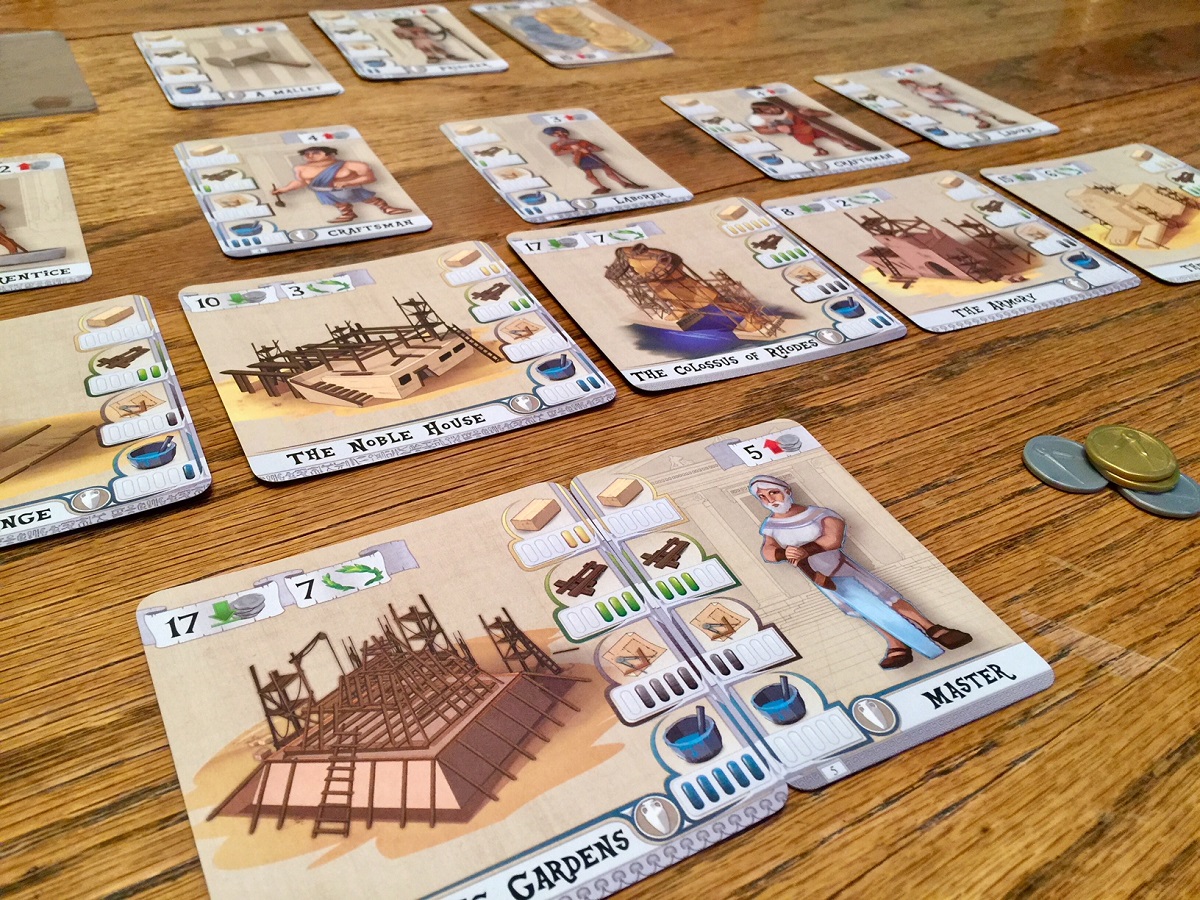
Boufbowl (9) – Fantastic soccer/football/rugby game where you maneuver a ball around a field with 5 man teams to try to score goals. This borrows a lot from Blood Bowl, though the movement has been simplified into zones (which you can lock down by assigning defenders to your opponents pieces), and there is now a deck of cards that can be used to boost die rolls/perform special abilities. Not only does the game nail the theme, but it’s actually very fun and full of great decisions. Do you attempt to tackle that defender to allow yourself to run the ball down the field? Or do you try to pass (and avoid interceptions) to set another teammate up for a scoring opportunity. Or do you play a card to have a teammate pick up your mini with the ball and throw them a few zones down field? If there is a drawback, the game can be a little dicey, especially if you are prone to risking unsupported plays, but otherwise this is a fantastic game, and I don’t just say that as a Krosmaster: Arena super fan.
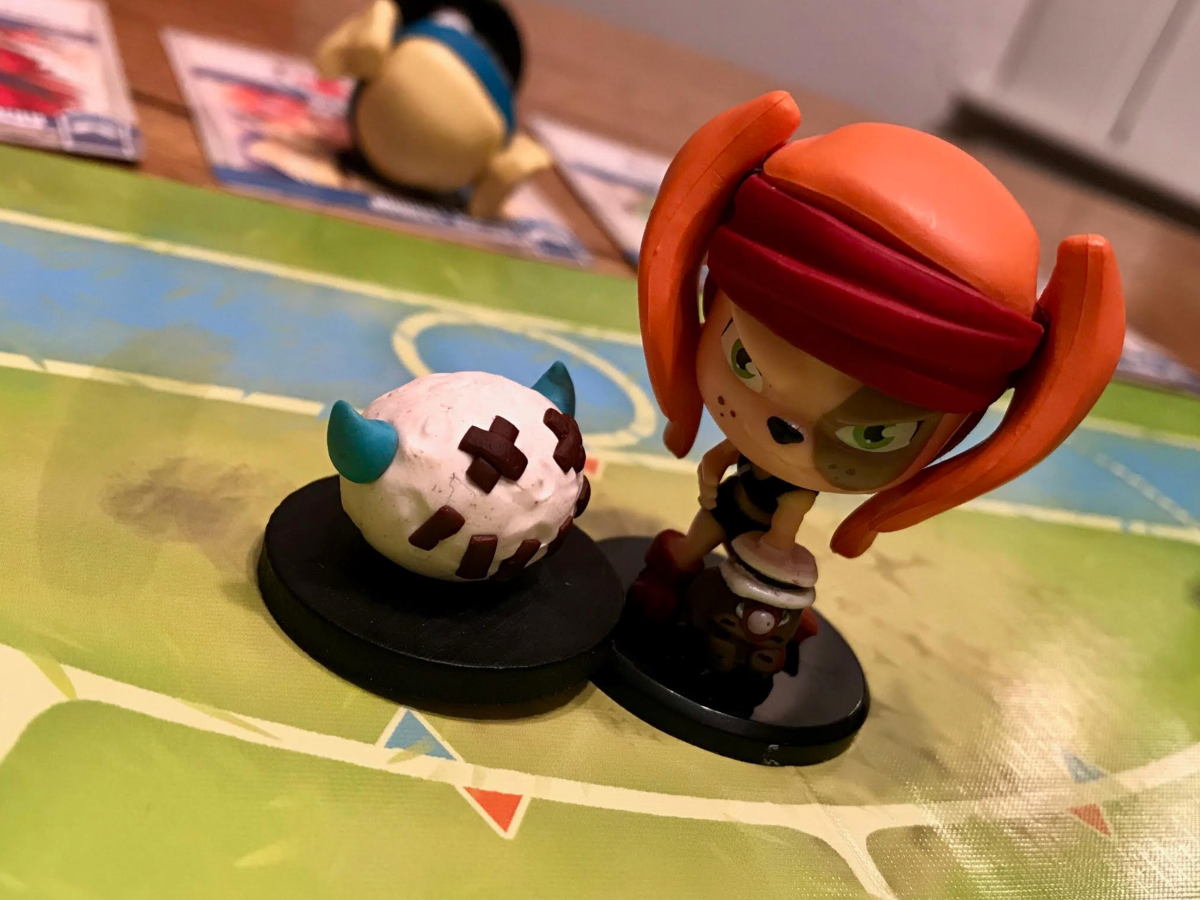
Monikers (8) – Based on the public domain game Celebrity, this is actually a quite good combination of memory, charades, and coming up with the perfect single word to describe a famous person. The mechanic of continually cycling through a set of the same cards, first describing the people in full sentences, then a single word, and then just with charades to get your teammates to guess who you are is a very elegant way to incorporate memory elements into a more traditional party game.
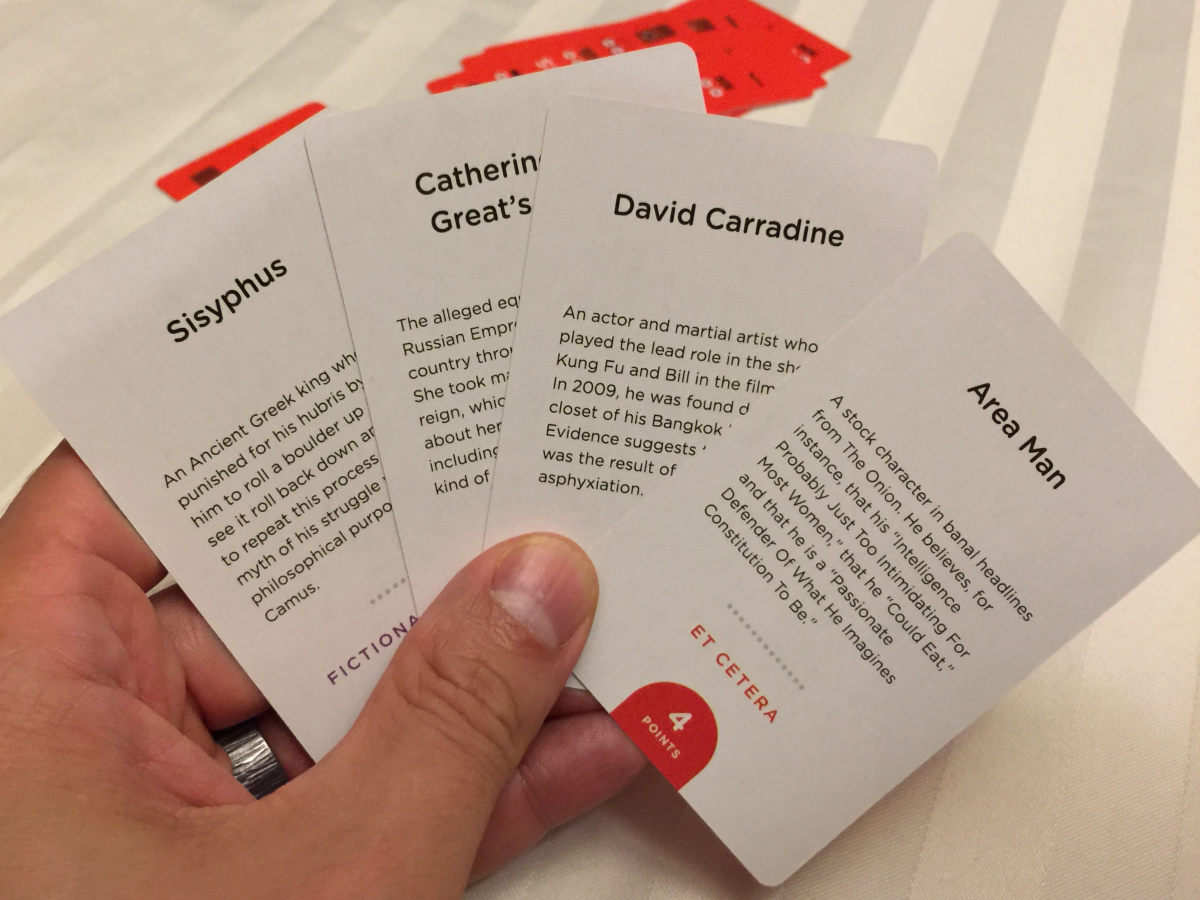
Farkle (4.5) – This push your luck dice game isn’t as bad as I feared it would be, but it still by no means good when compared to the modern push your luck dice games. The main issue is that the randomness element is way to high–with the biggest points being awarded for lucky initial rolls. There’s some fun to be had here, but I can’t think of many situations where I’d pick this game over the horde of better options out there.
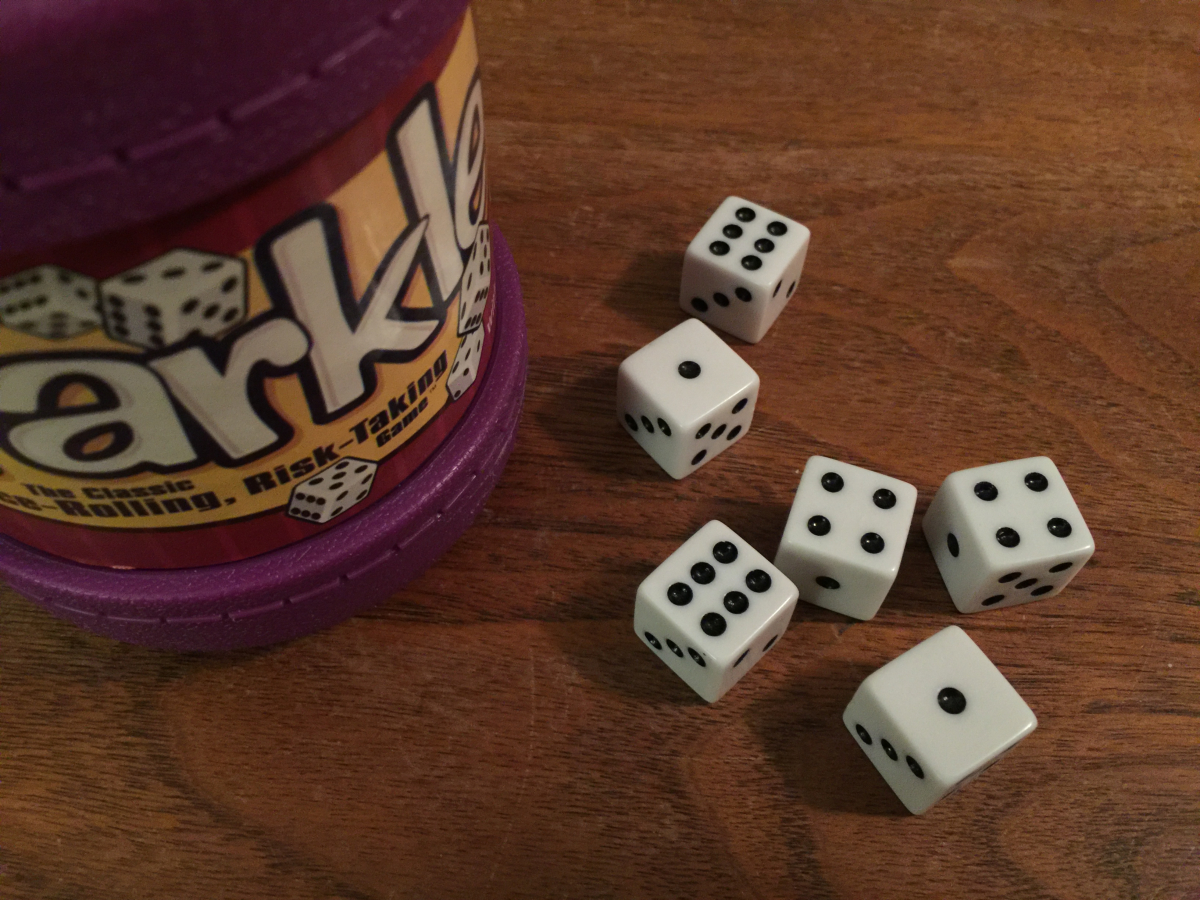
Neuroshima Hex 3.0 (9.5) – This is a fantastic asymmetrical (all the teams are wildly different and yet still appear to be quite balanced) tactical combat game that is all about positioning your pieces to be in the best place when the period battles get started. If you draw a battle tile and don’t quite like the looks of the board, you can choose not to fight, and keep trying to sway the board state in your favor instead. Add in the clever initiative system (some pieces will act before others in battle, thus removing the biggest threats before they can act), and plenty of maneuver opportunities and you have a brilliant, quick playing tactical combat game that will play out differently every time.
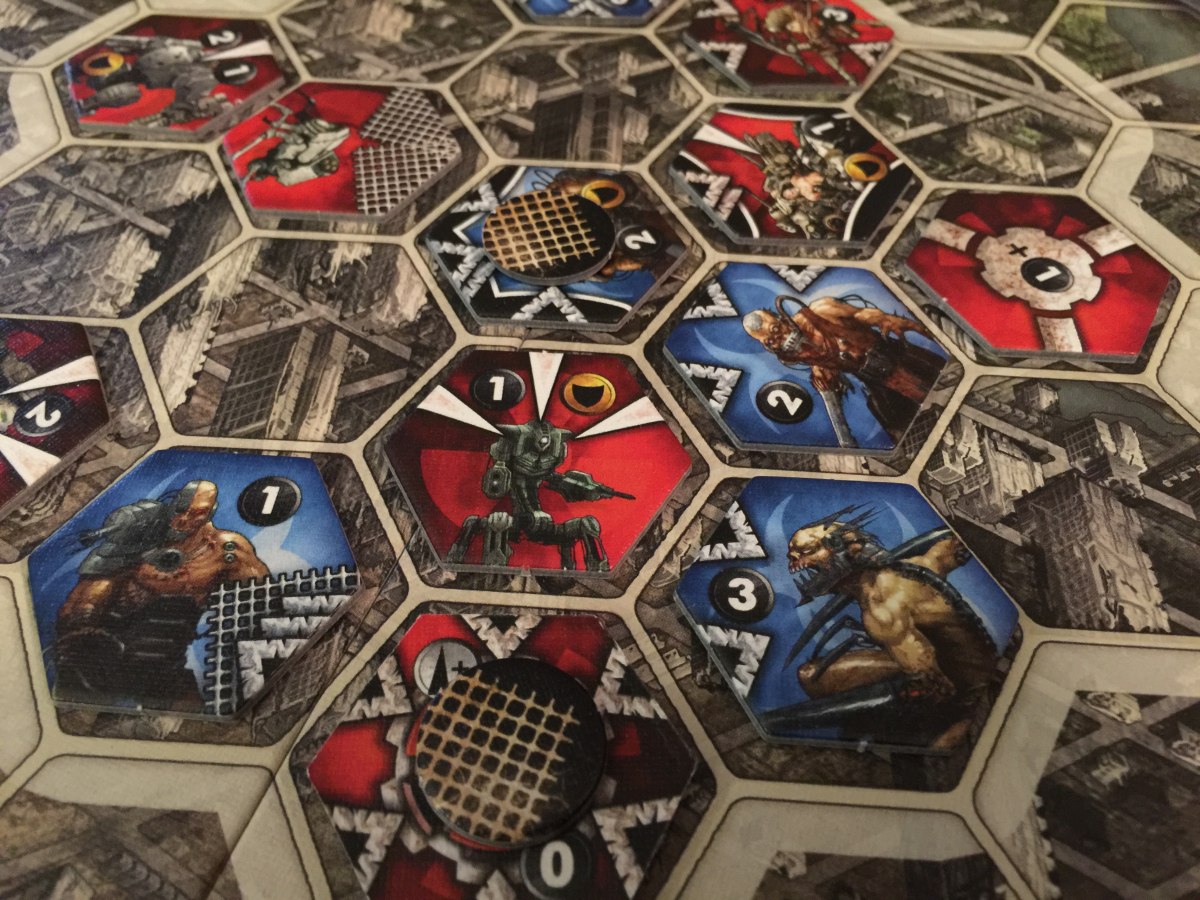
Cribbage (6.5) – Players take turns playing a card in order while keeping track of the running total (which can’t go over 31) and any straights/pairs/totals of 15 in recently played cards garner points. There is a solid game here, but “keep a running total” is never a very elegant mechanic for scoring points, and the various odd little rules and exceptions for scoring points don’t exactly make this very easy to jump in to. I’m suspect repeated plays would reveal a solid game, but as it was nothing was making me want to play enough to see.
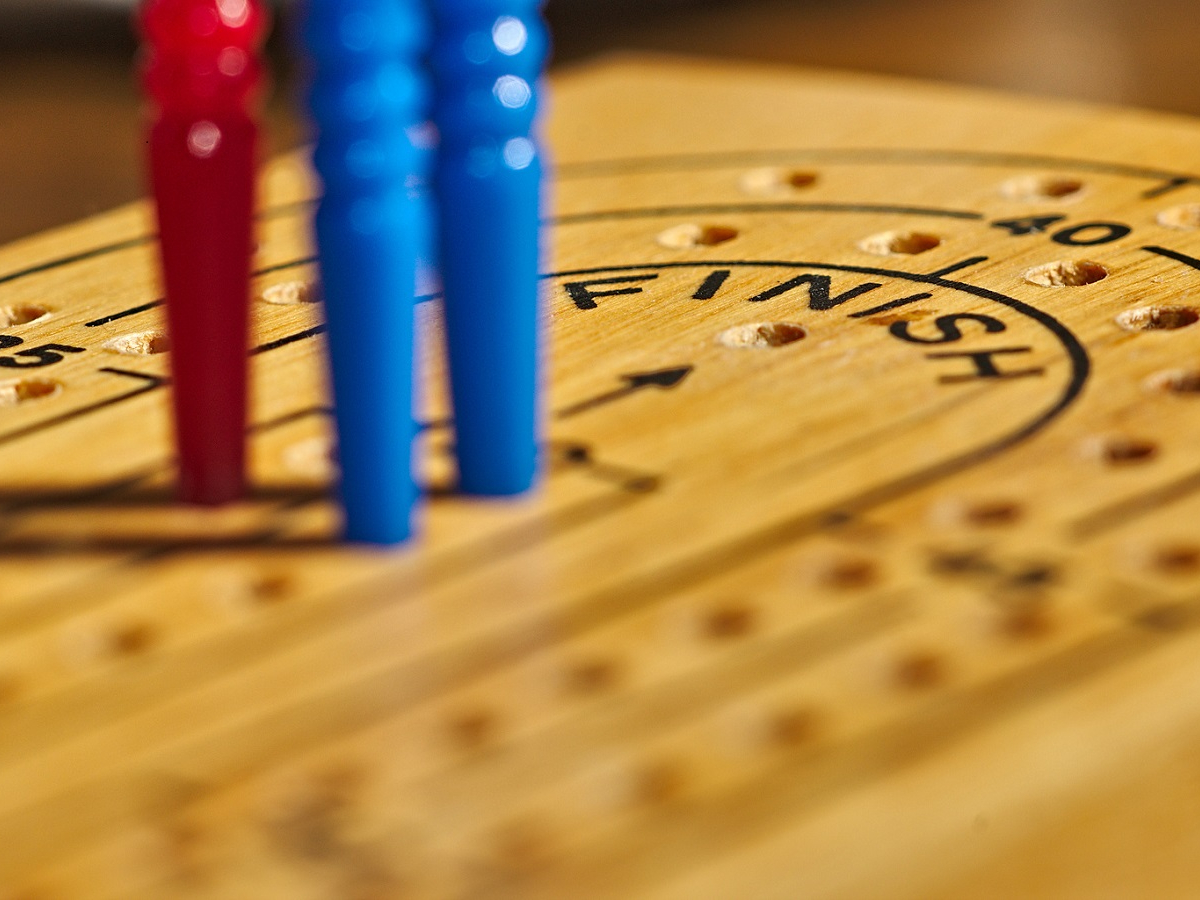
No Thanks! (7.5) – Very simple game where, on your turn, you either take the top card (garnering points–which you don’t want) or place one of your chips on the card to pass the choice on to the next player. As the player’s money totals change and the cards become more or less valuable (if you get a straight only the lowest card is scored against you) decisions on whether to bid or not become quite interesting. However, for a supposed “entry level” game, a few of the more gamey strategies (pass on cards you want in order to force others to fill it with chips before you take it) are probably not immediately obvious to new gamers.
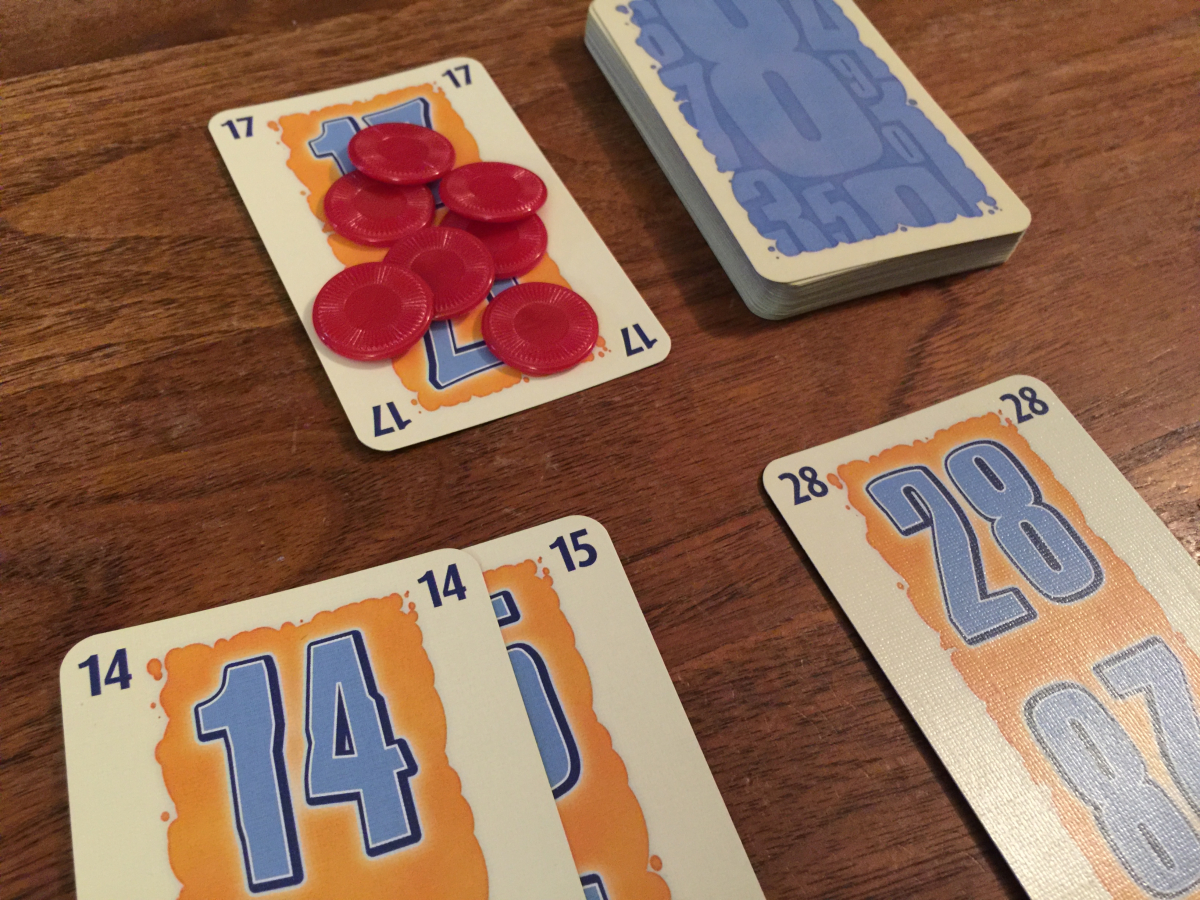
Voodoo Mania (6.5) – A speed recognition game that involves quickly spotting the missing color/item combination on the top card of a deck by finding it in your hand of three cards (front and back) and calling it out before the opponent (netting you the card for points). Fast playing and fun enough, though this space is already plenty crowded, and this game is slightly prone to someone calling out the wrong item without anyone noticing if you are playing quickly.
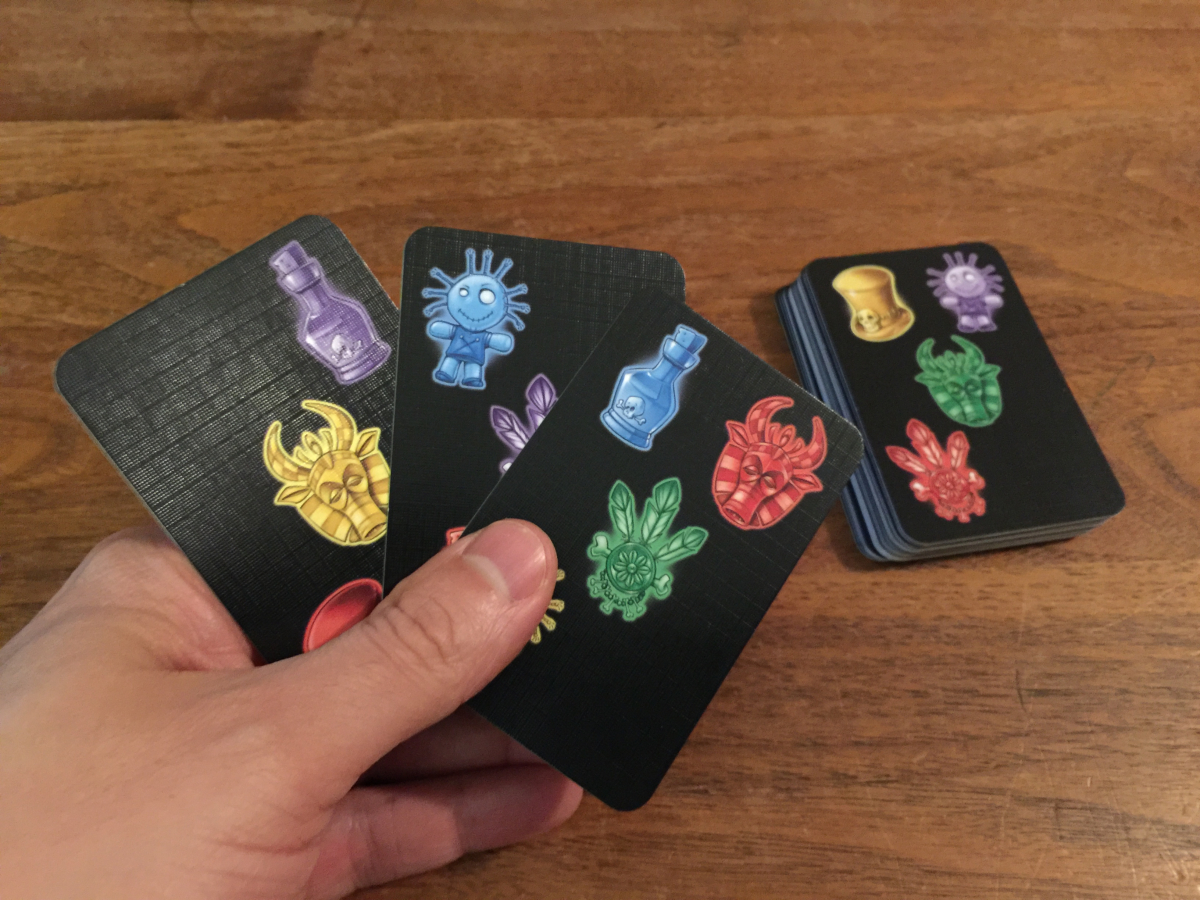
Mage Wars: Academy (8.5) – Mage Wars is basically Magic, except you have access to your whole deck at once, and must use your turn’s allotment of mana points to pick the perfect spell to counter your opponent’s plays on the previous turn. Mage Wars: Academy removes the “Arena” board, and I must admit that it ends up being a huge improvement over Mage Wars: Arena. The original would often bog down in a giant overcrowded pile-up in one square on the board, so this just abstracts all movement and range in the service of making a more streamlined, playable experience. It also plays much faster now, which is a huge plus. Some tactical crunch is lost, but not enough for me to really feel like going back to full Mage Wars.
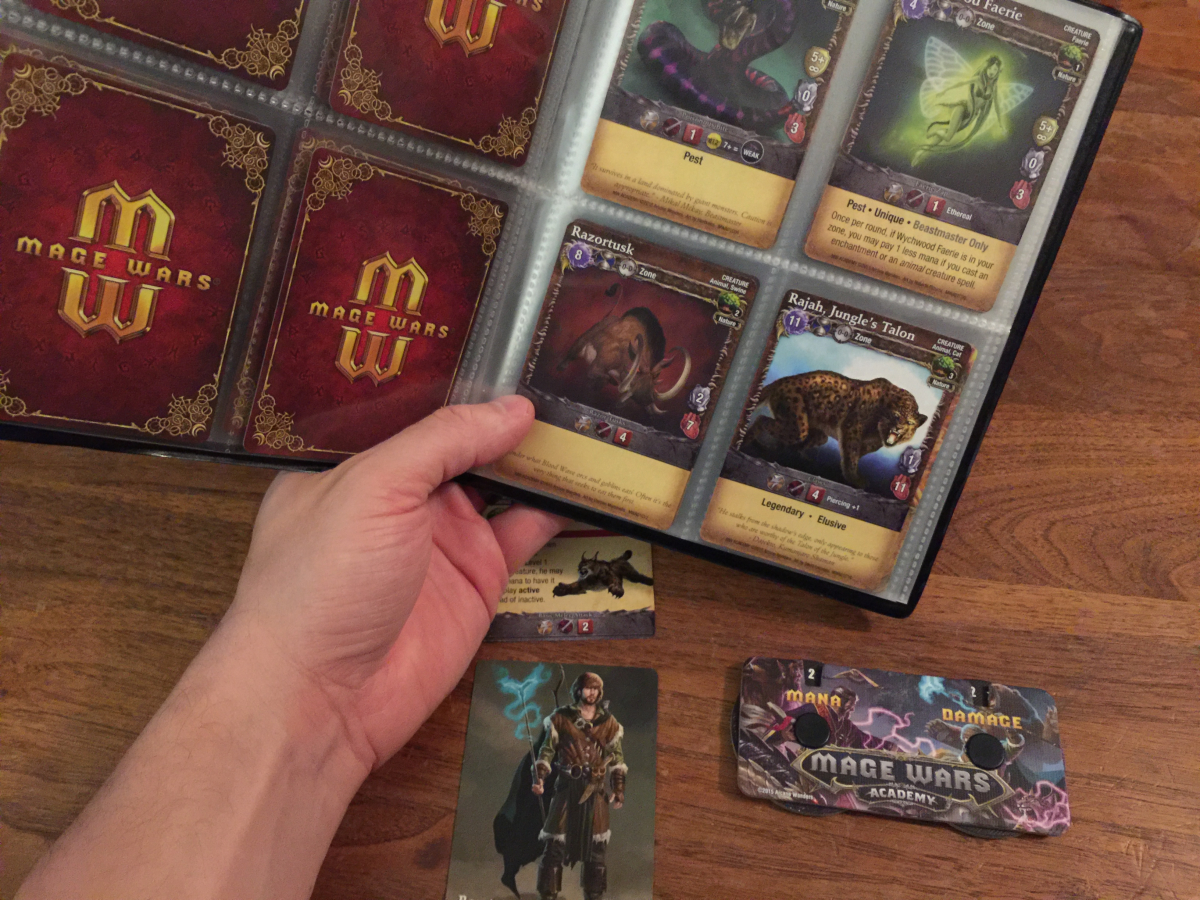
Warhammer Quest (5) – Classic dungeon delving game really shows its age, and mostly in bad ways. The theme and joyous overuse of chromey rules text is charming, but in play it all boils down to a pretty random experience of chucking dice at endless hordes of samey-feeling monsters. Perhaps the biggest drawback here is how static the battles feel. Movement is rarely a game changer, and is usually used to simply move a little closer to possibly cleave a few more targets from the horde of monster facing you. Also, a healing wizard is often essential, but it’s rarely fun to simply turtle in the corner while the wizard heals over and over.
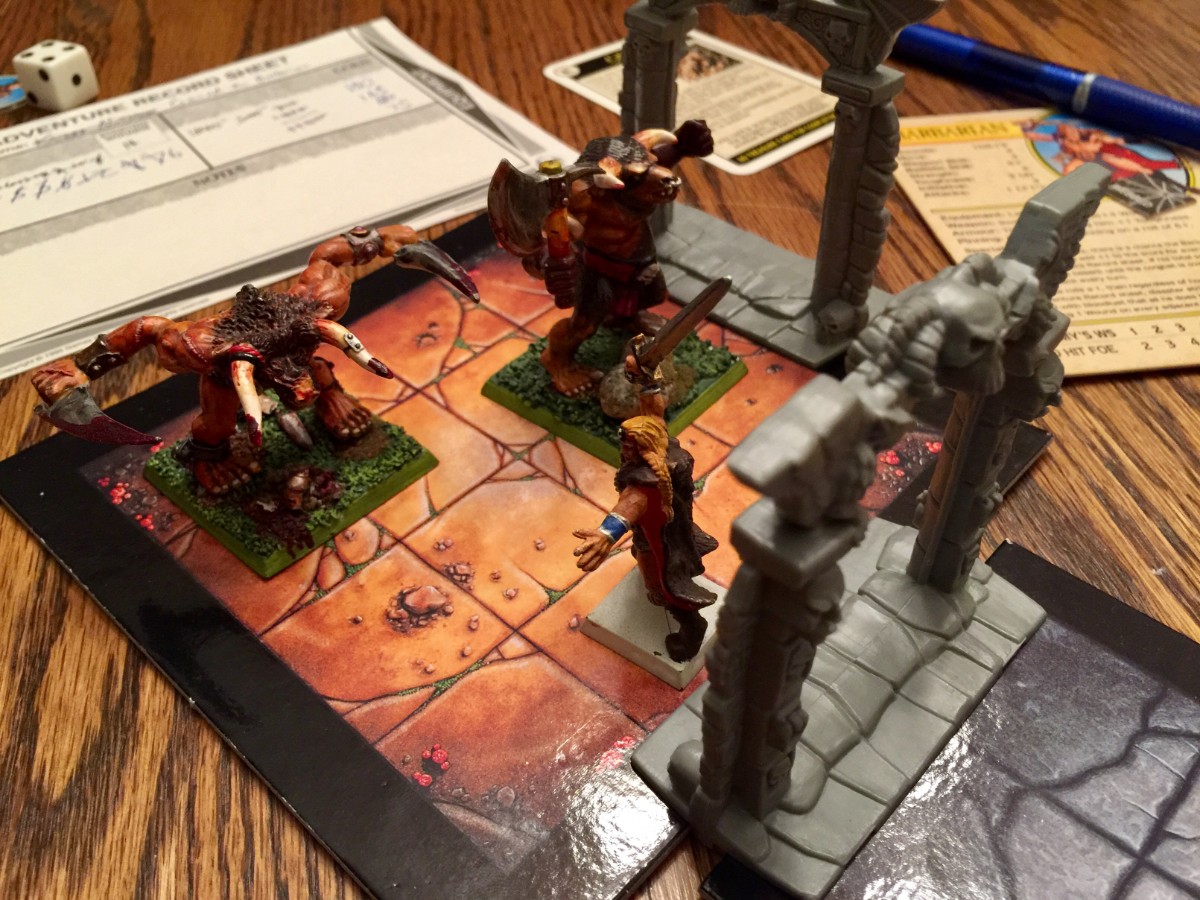
Tribune: Primus Inter Pares (7.5) – Ancient Rome themed worker placement/set collection game where you place your workers on a winding road through the city of Rome to collect cards in various ways. You then use the cards to control various factions which give either bonuses or fulfill end game victory conditions. The card drafting is very fun, but when it gets down to faction control the rules become a tad less elegant and almost more work than the game is worth. Overall, the game overcomes this as worker placement and set collection makes for a good time if you are in to that kind of stuff.
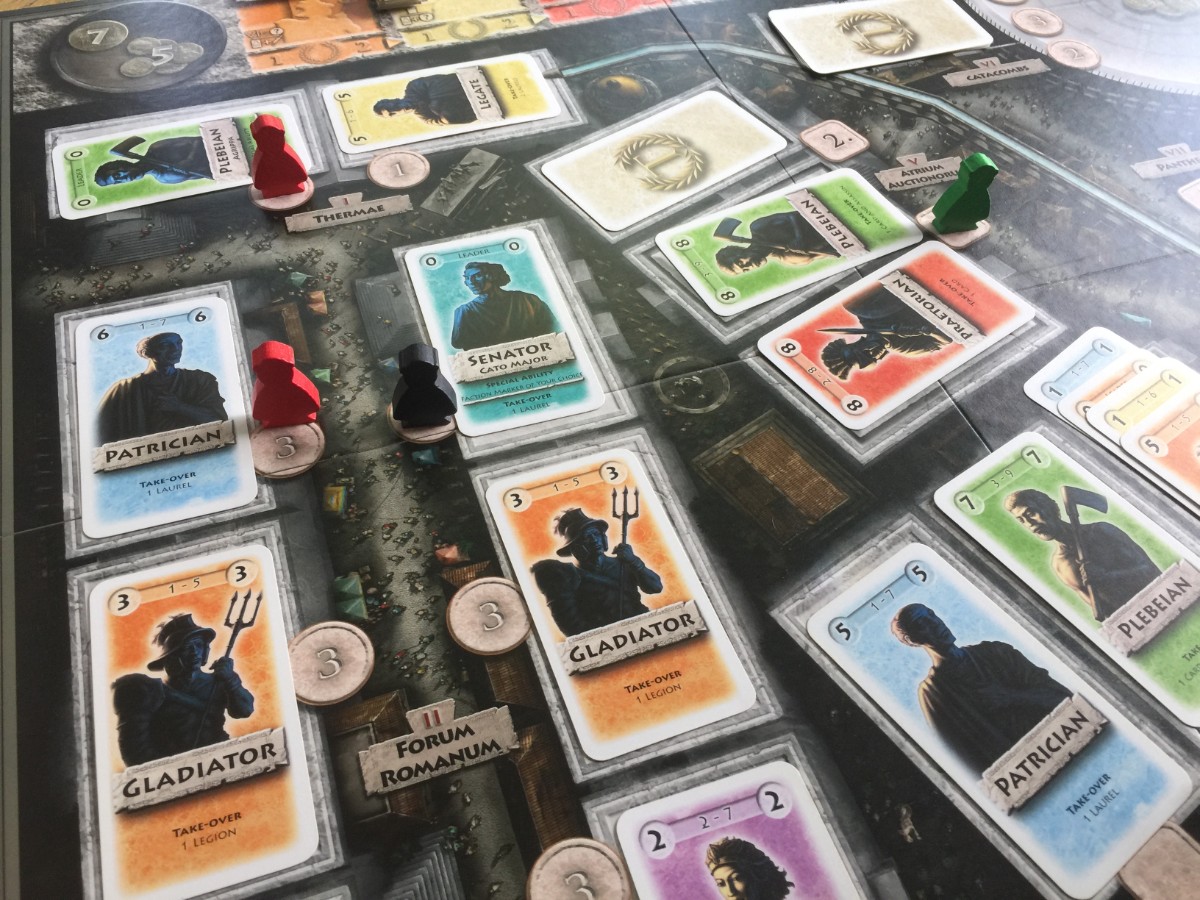
Tobago (9.5) – Very unique treasure hunt game where you play cards to narrow down where the treasure on the map is or isn’t (for example, if I play the “within 1 of the largest lake, then it narrows down the treasure location to a smaller set of hexes. Once the treasure is found, everyone races to divvy up the coins. There are a lot of clever and unique mechanics at play here that make this one a real delight. This is one I definitely need to play more!
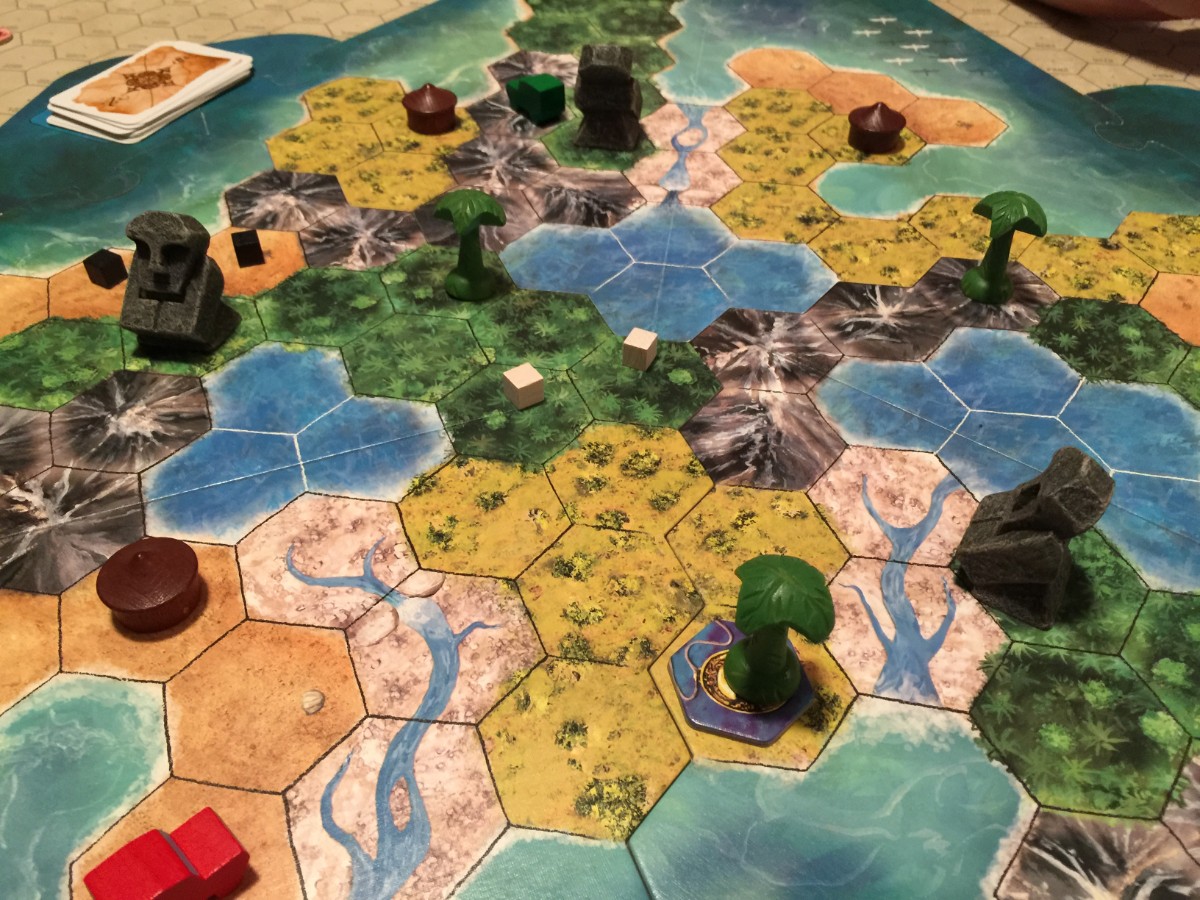
Rent a Hero (6.5) – This is a pretty simple game, but I still found it a little hard to grasp the overall flow at first. Basically you are trying to collect an almost complete set of cards by passing them around the table face down. If you take a card that you already have you lose them both, otherwise you keep it and have access to its power once in the game. Fun enough once it got going, but I didn’t have much desire to play again.
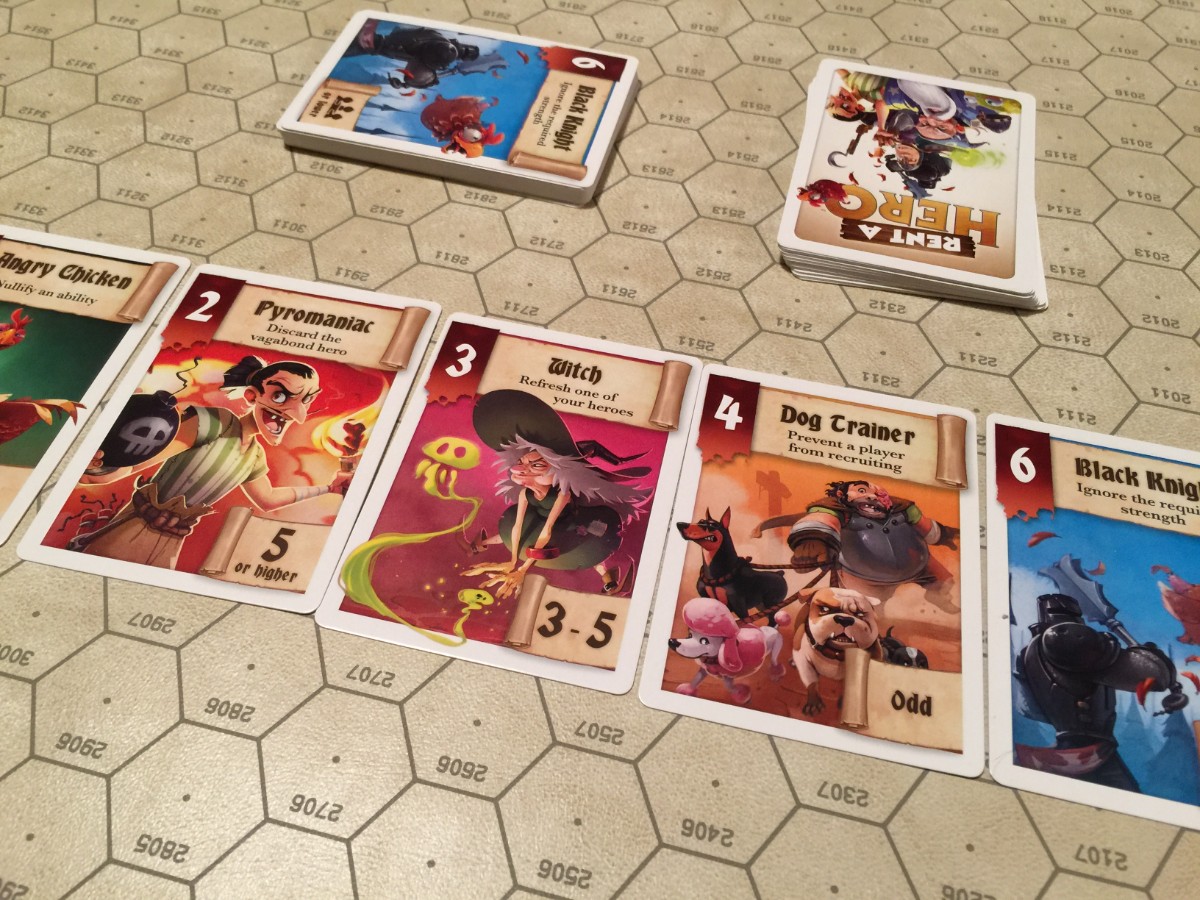
Pack & Stack (9) – Brilliant game of spatial organization where each player is given a random number of differently sized boxes, then a bunch of truck tiles are flipped up and you have to race to snatch the truck that will best fit your “boxes.” You can not stack your boxes past the edge of your truck’s shape, or higher than its height limit. That’s basically it, but it is very fun to try to identify, on the fly, exactly the best truck for your random assortment of boxes. Once you have them, stacking them up rarely takes much brainpower, but this is a game that is all about making instant size assessments (usually to disastrous results if your assessment is off).
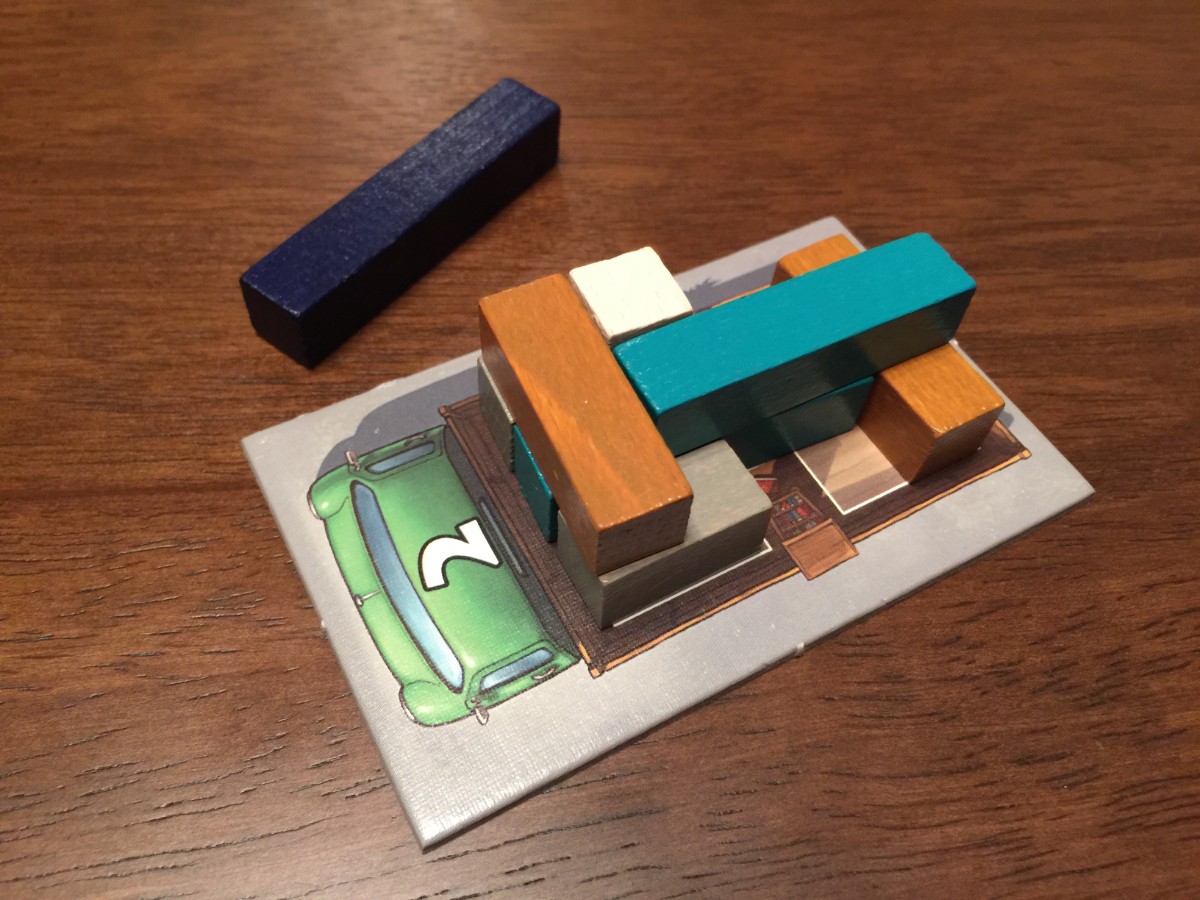
Hurry Cup! (5.5) – This is a much simplified kind of Formula D game, where you race to grab a colored die that will suit you the best, and then all players share a white die roll. As long as your combination of the two rolls doesn’t exceed the posted speed limit, you can move the amount shown on the colored die around the track. Various power ups are scattered around the track, along with a few extra catch-up mechanisms. It’s perfectly playable, but, honestly, the 2d6 roll is so random that the decisions on which colored die to take are rarely that interesting.
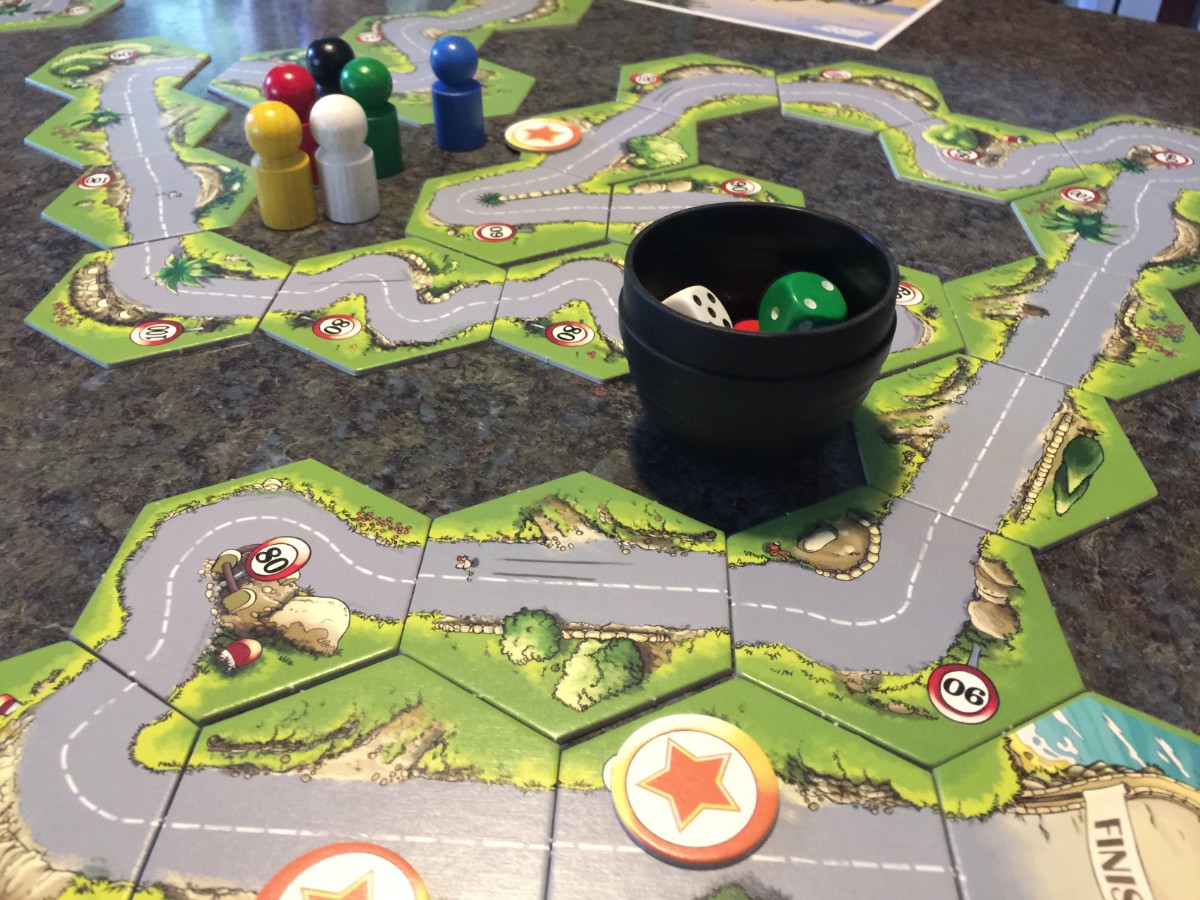
Hip Flip (6.5) – Not really much of a game, (and I don’t think this will be a Swivel killer), but still pretty fun. Basically set yourself up with a partner and a bar with a swinging arm in the middle, and then start gyrating hilariously while attempting to get the arm to swing around and around. Good for a few laughs, possibly even more than a few.
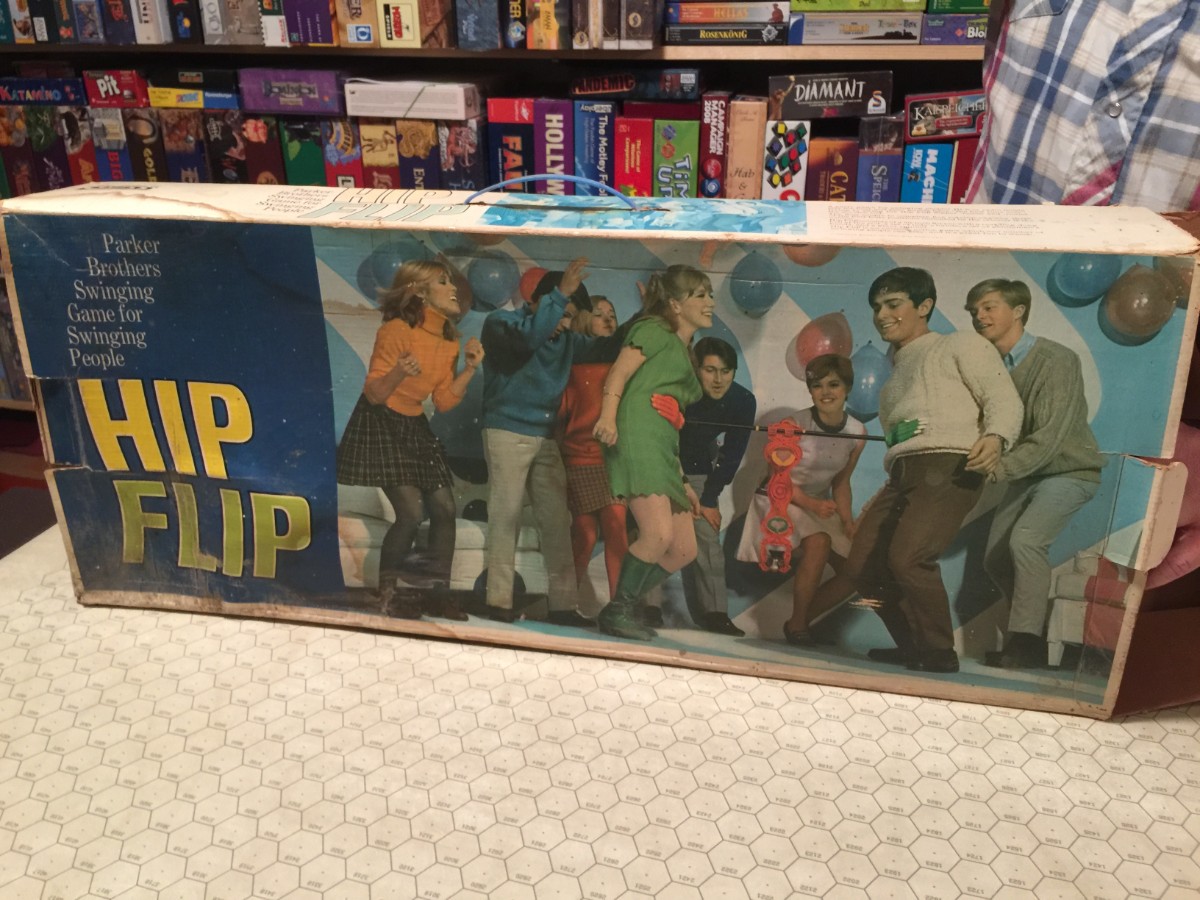
Elder Sign (7) – Arkham Horror themed dice game, with the usual amazing FFG production values and artwork. The game itself is the usual Yahtzee style roll and reroll, only this time with a ton of eldritch chrome added in. I’m not convinced it’s all that GOOD of a game however, as there is a bit more luck in the dice rolling (less chances to save dice/reroll than I would like) that I usually prefer in games like this. Also, the chrome kind of pushes this out of the light and quick realm it really wants to be in. Still, cool theme and it looks great, I’d be down for a few more plays.
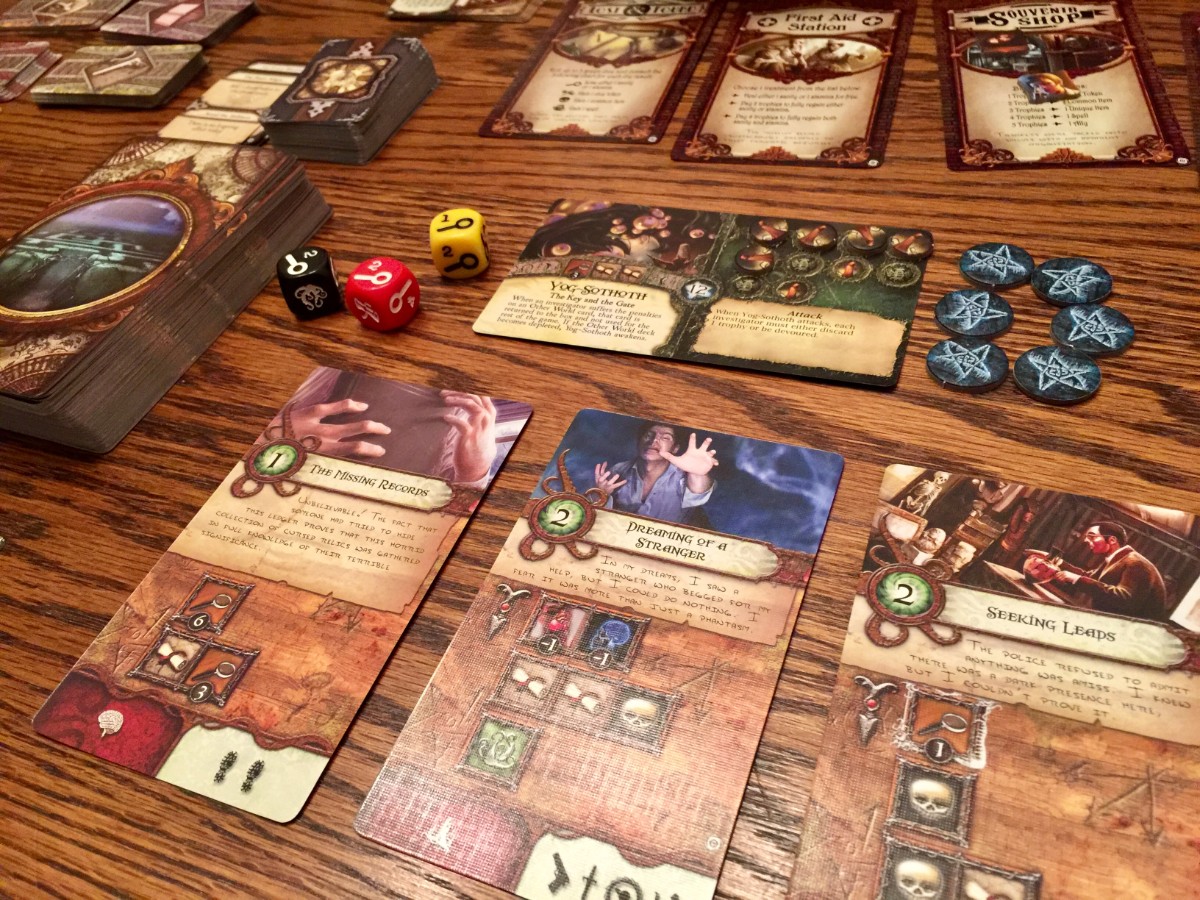
Code Omega (7) – From the makers of Ubongo comes another puzzle game–this time you are trying to lay your three tiles onto a board so that you make a single black bar from top to bottom. It can be deceptively hard, but something about this rings a little flat (no pun intended) when compared to the more open arrangement of shapes in Ubongo. Also, it goes without saying that the scoring system is quite arbitrary and random.
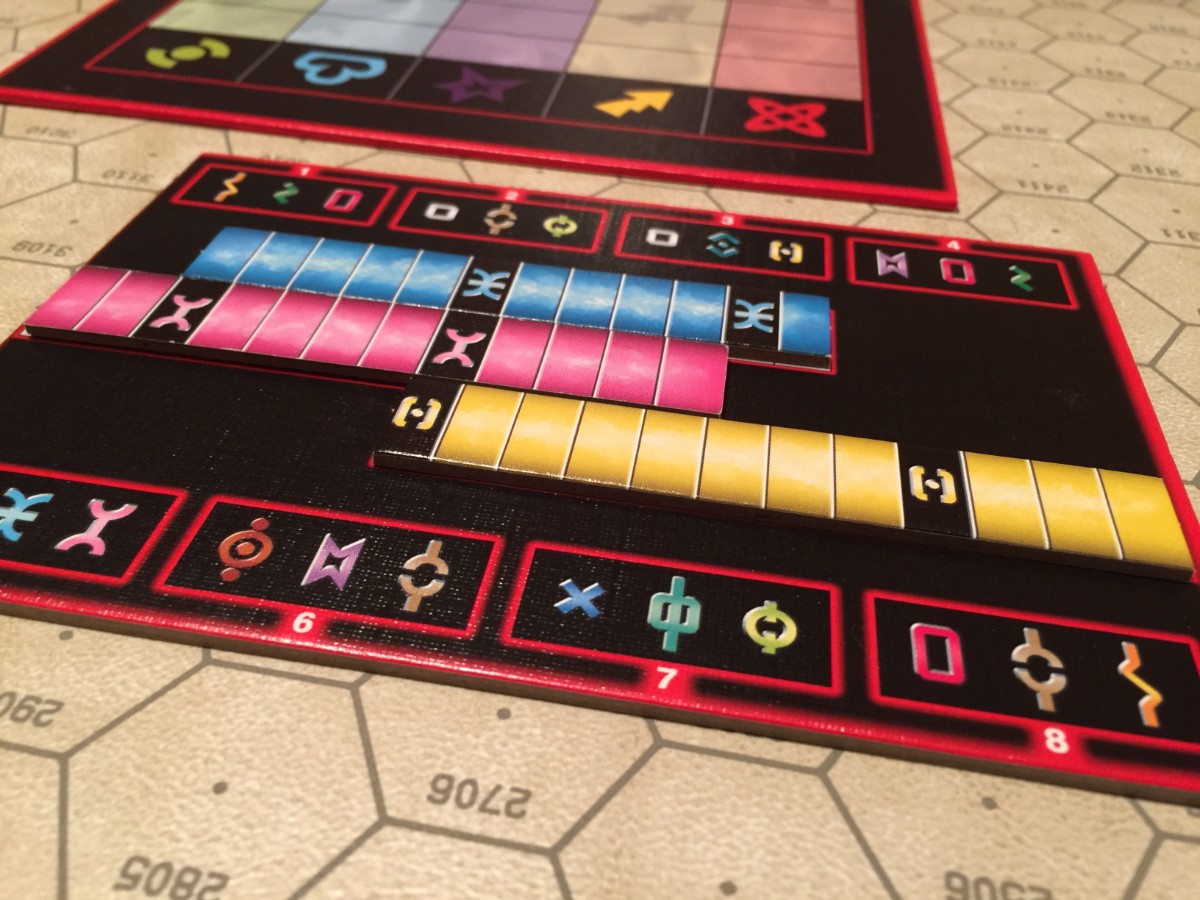
7 Wonders (10) – One of the best games out there for large groups (as long as the new players don’t mind taking the first half of the game to learn how to play), this one plays fast, and is just fun as hell. You spend 3 ages drafting tech and resources to build better tech and resources (as is the wont of all civ games), while periodically scoring military points. It’s all very elegant and clever, and the fact that it doesn’t play two well hardly matters as the official 2 player version, 7 Wonders: Duel, is an even better game!
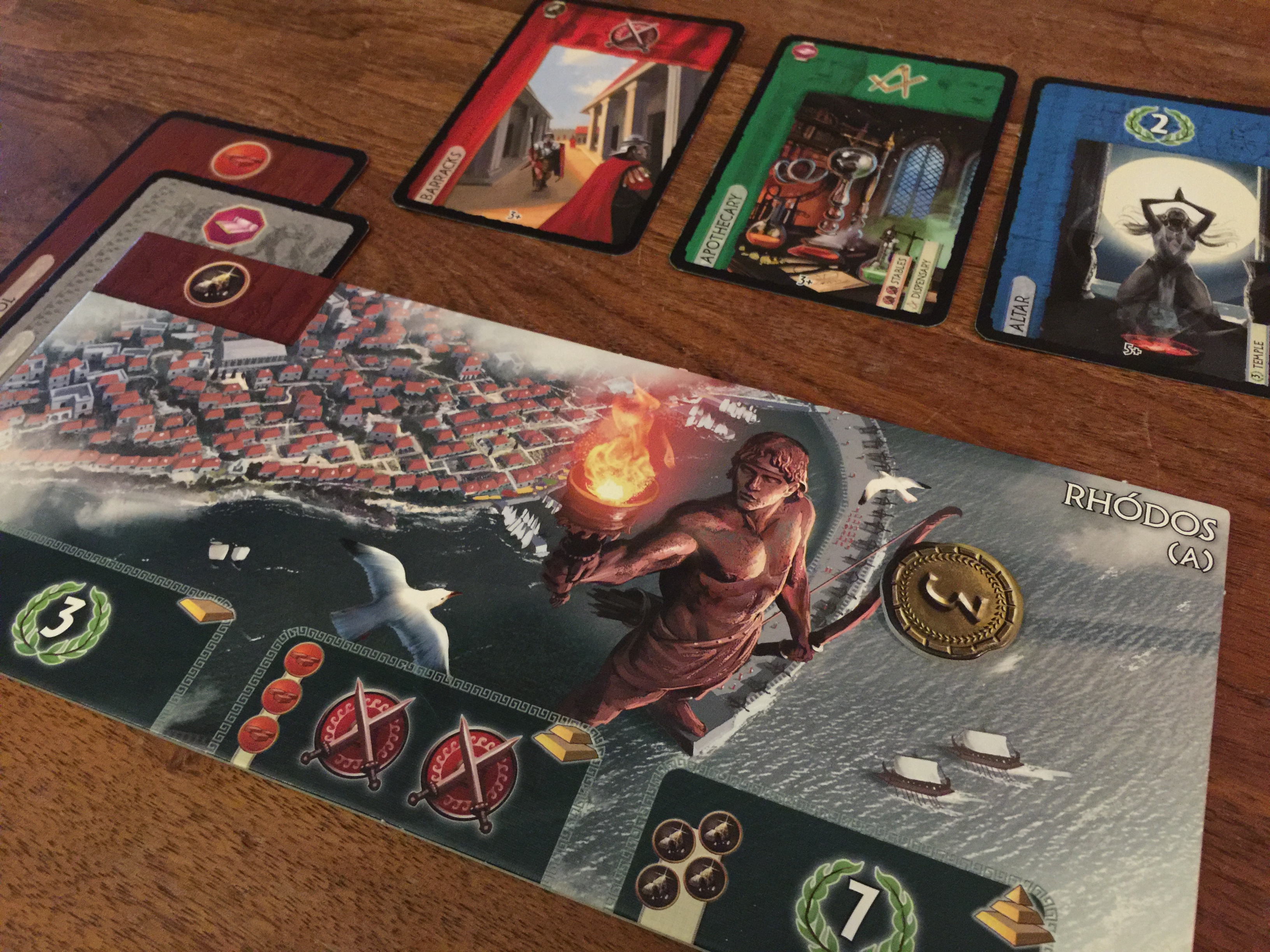
Enigma (9) – Very cool puzzle game where each round players pick from one of four options: a 3D shape puzzle, a Tangram puzzle, a pipe connection puzzle, or a weight arrangement puzzle. Thus all players race o complete different puzzles (with the winner starting a short timer for the other players to try to finish). The scoring mechanism is a slightly overwrought mini-game, but it’s fun too once you get a handle on it–and does a good job forcing you out of your comfort zone to try puzzles you aren’t as good at. This one also does a nice job of balancing difficulty between puzzles–there will always be easy ones, but by and large the balance seems good.
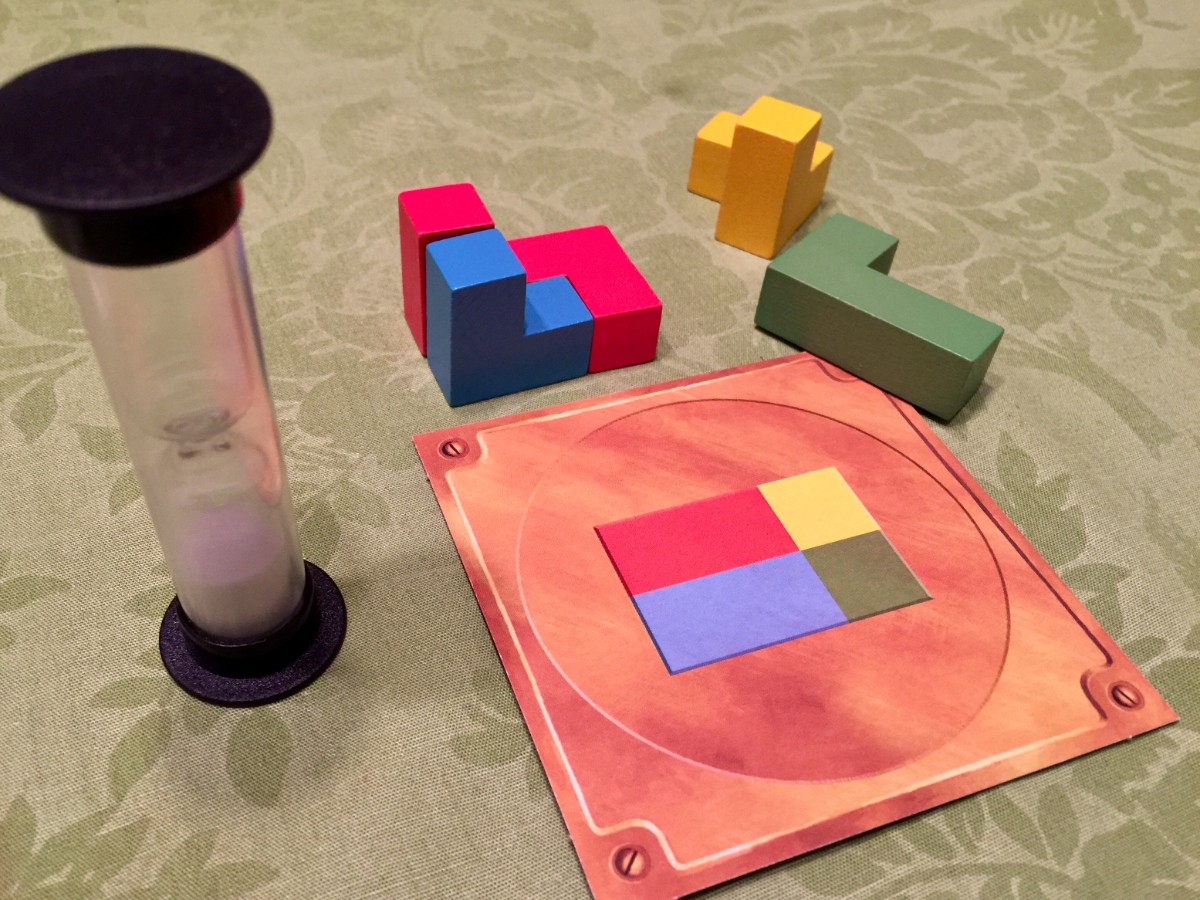
Coup (9) – Great bluffing game where you play behind the scenes power brokers with influence on two political figures…over the course of the game you can claim influence over certain people to gain benefits, but if anyone calls your bluff you might have to show one of your cards to prove it. If you didn’t have the card, you lose one of your cards permanently, and the last person with face down cards wins. Great bluff incentives (though people who get the right cards and never lie can sometimes win easily), and the cool Dune-esque art is a big plus too. This does have player elimination, but it’s short enough I can probably forgive that flaw.
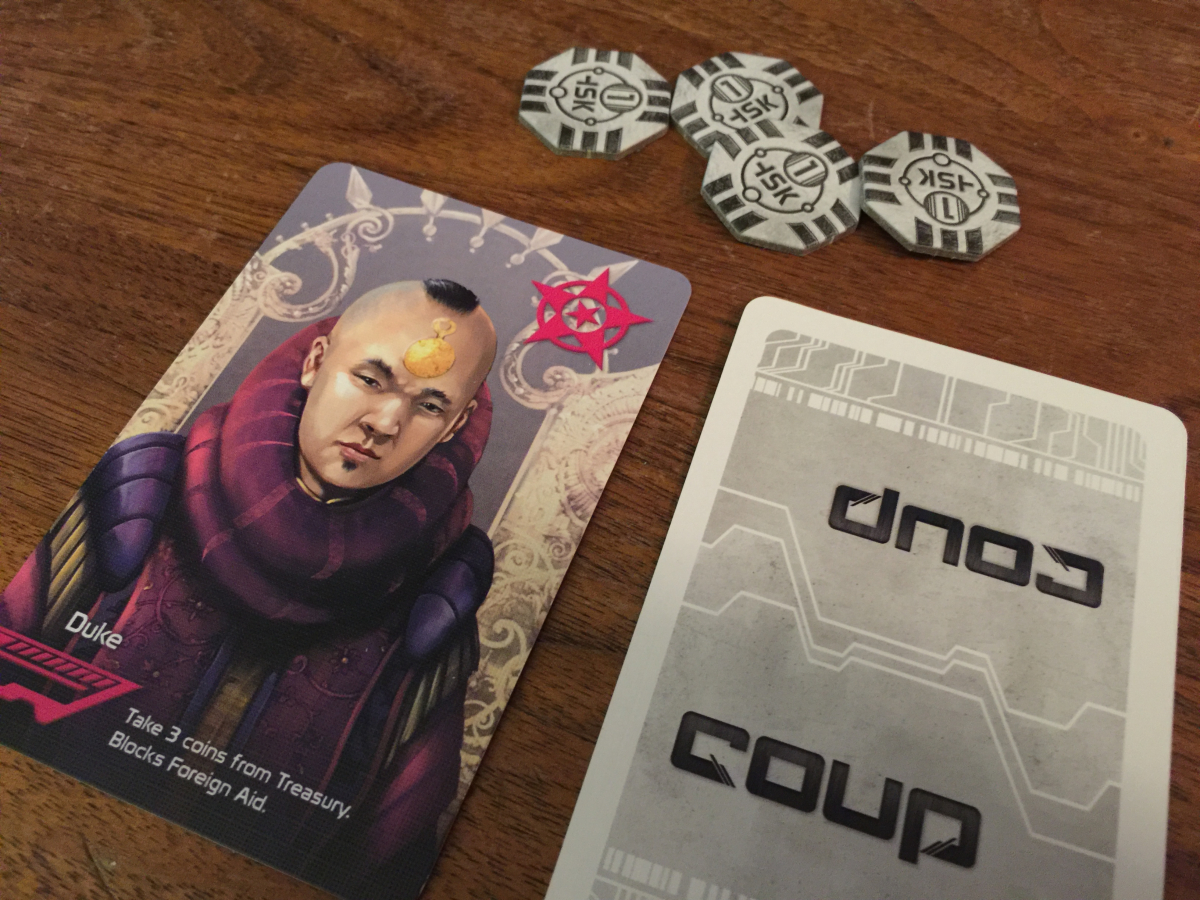
Sticky Stickz (9.5) – Simple game of rolling dice and then racing to suction up as many tiles as match the dice combination as quickly as possible. It’s fairly easy to spot the ones you need to grab, but getting there in time (and catching the new ones that are revealed) is a nice level of suction cup stick-bending chaos. Again, it’s a simple concept, but it’s executed beautifully, highly recommended.
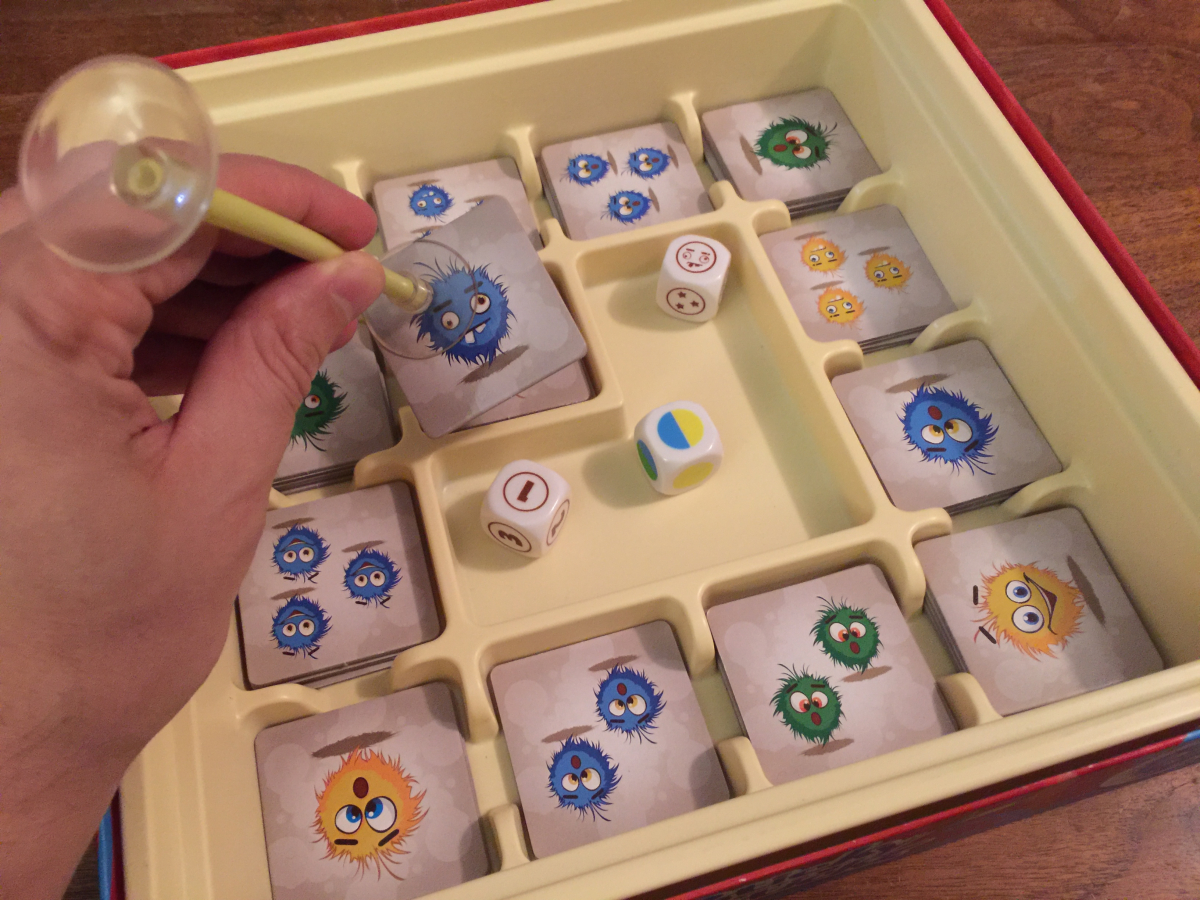
Coloretto (9) – Great game built around the simple concept of each person collecting slightly different sets of cards, and the players taking turns adding cards that benefit them the most to piles they will eventually take. This is easy to explain, it plays fast, and there’s a lot of good decision making at play each turn (that only gets more interesting as the game progresses). A classic for a reason!
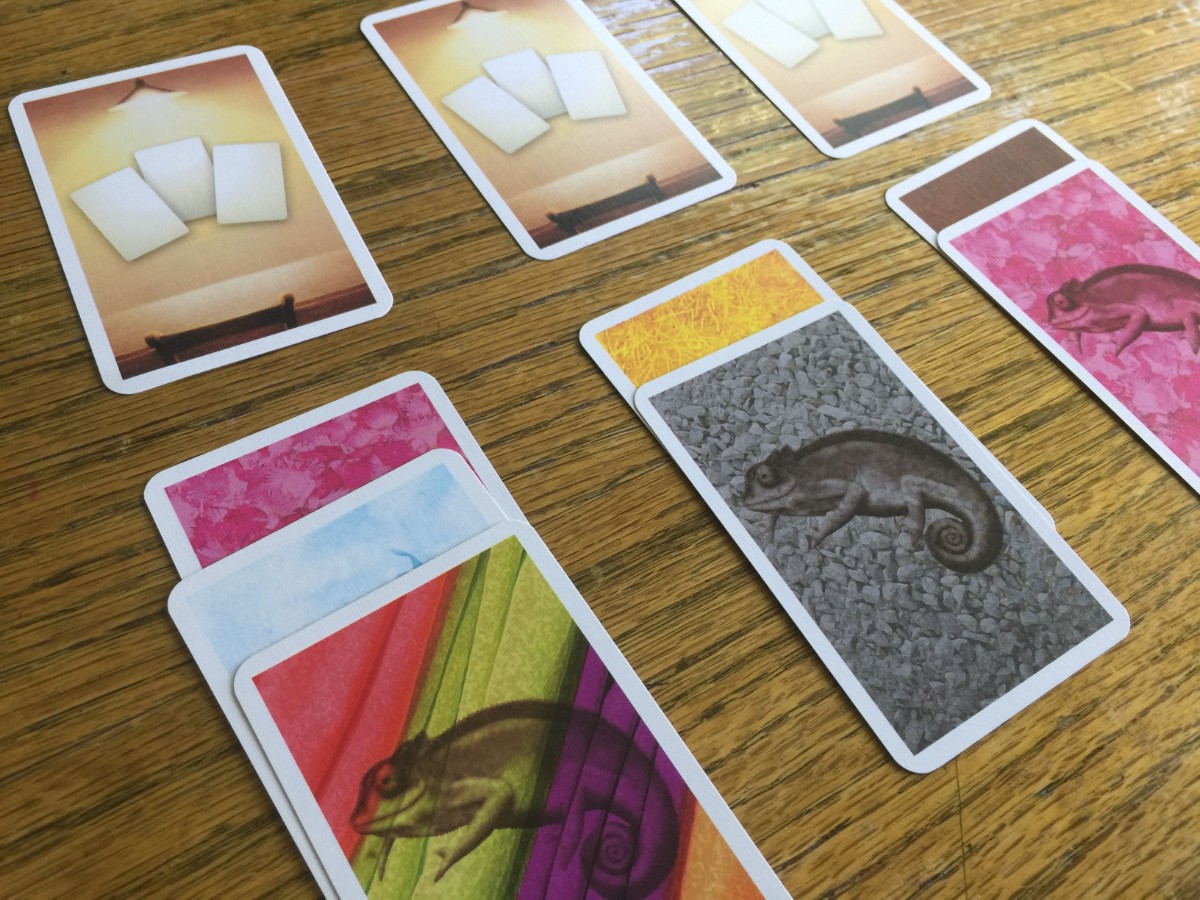
Cardline: Animals (9) – This is basically a much simplified version of Fauna, and an excellent use of the Cardline system. Each turn players have to add animals onto a line of cards arranged from smallest to largest by size, weight, or lifespan. If you insert your animal into the wrong place on the line, you have to draw a new card, first player to run out of cards wins. Reminding new players to play their hardest cards (the ones they know the least about) first is essential (as the placement only gets harder as the game goes on), but otherwise this is a fun, and surprisingly engrossing game that’s always worth a quick play.
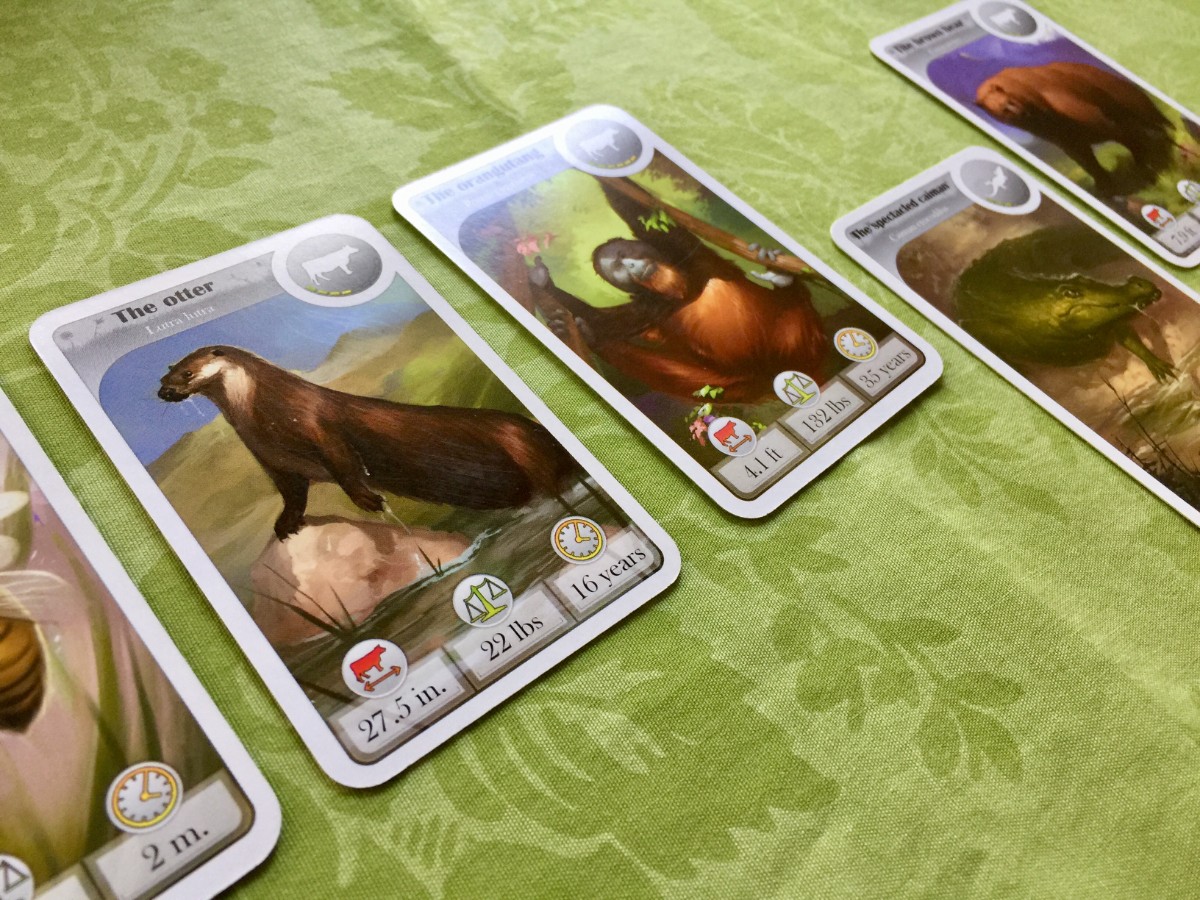
The Quest for El Dorado (10) – Knizia takes on a deckbuilder and absolutely nails it. In this case, player’s decks are used for movement through a South American maze of jungles, villages and rivers, and the trade off of moving slowly to build up your deck, or barreling ahead to try to get to the end on limited resources is as perfectly balanced as you would guess. There is something just plain fun about progressing through the colorful board, and the simple card choices actually help keep the game moving and focused on mechanics over rules. I’d play this over Clank! any day!
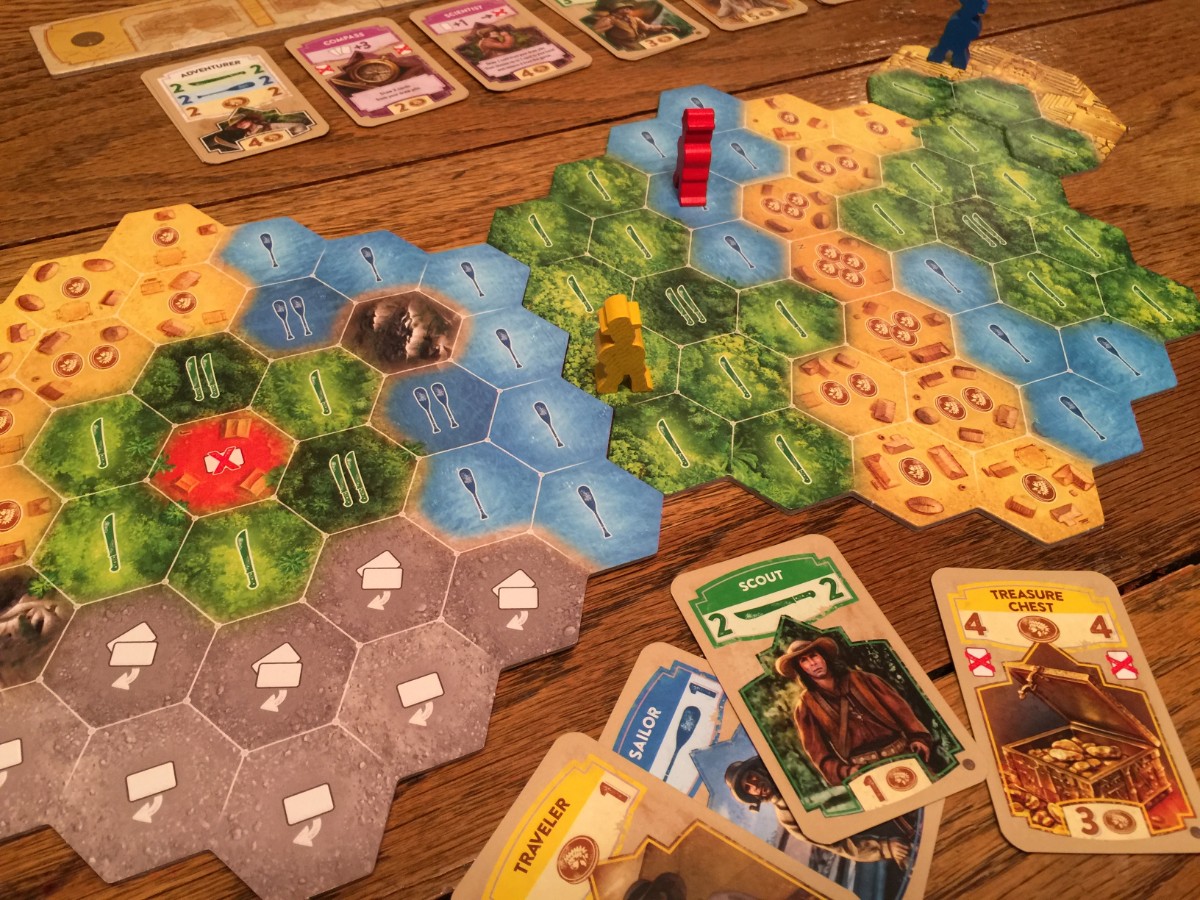
Loony Quest (8) – This is a game where players have to draw on a transparency in front of them how they would progress through a picture, then they put their transparency on top of the picture and see how well they did at avoiding obstacles and collecting the items they are looking for. It’s surprisingly hard, and unsurprisingly quite fun as well. I could see it getting a little samey, but it’s definitely worth owning and busting out from time to time!
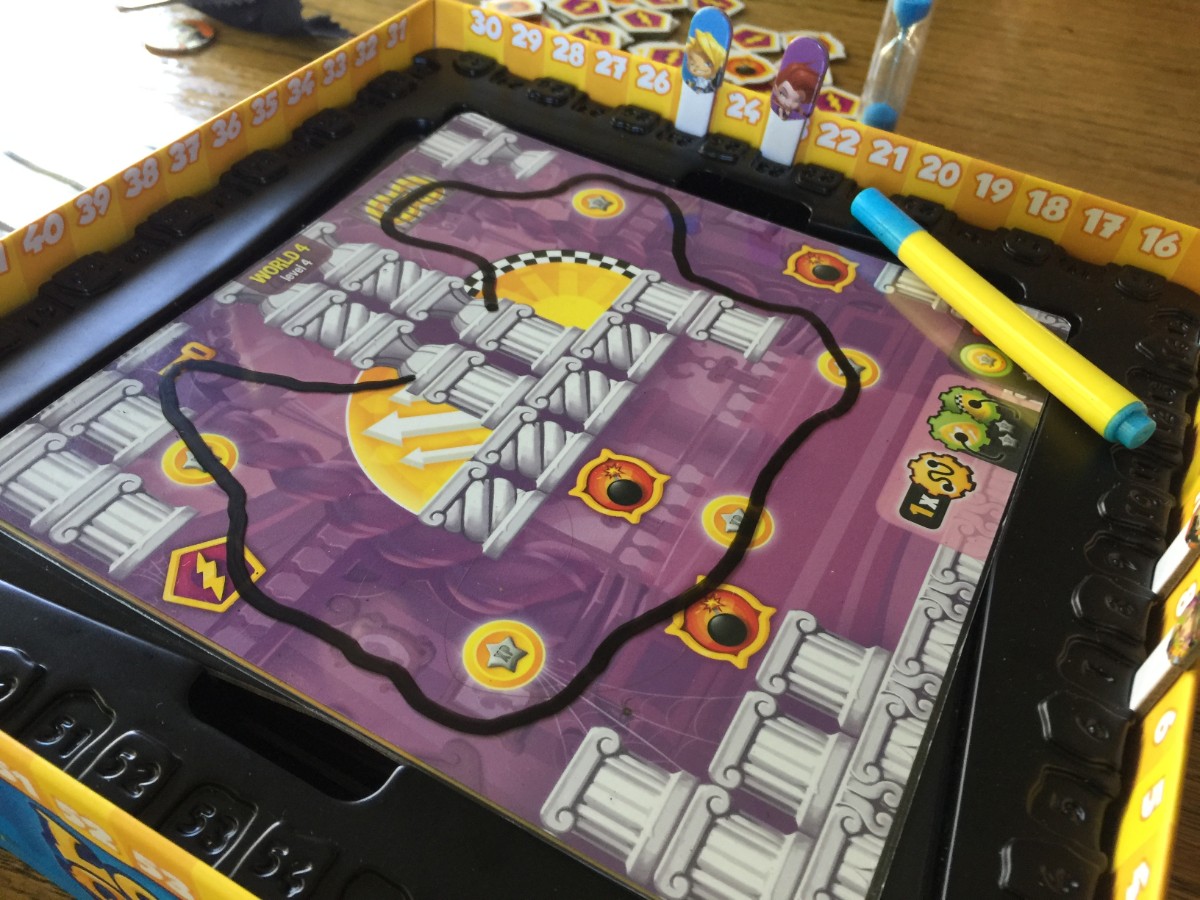
Pandemic Legacy: Season 1 (7) – The Legacy mechanic of slowly (and permanently) changing the game board and cards from game to game IS very cool and fun (seriously, actually ripping a card in half is exhilarating), but, and I’m not quite halfway through, I don’t know that the increase in complexity will be sustainable in this game. Base Pandemic is fun, the changes so far have been novel, but at some point the game will become way too bogged down in chrome. I feel like that point is getting close, and doubt I’ll finish the campaign, but what I’ve played so far HAS been enjoyable.
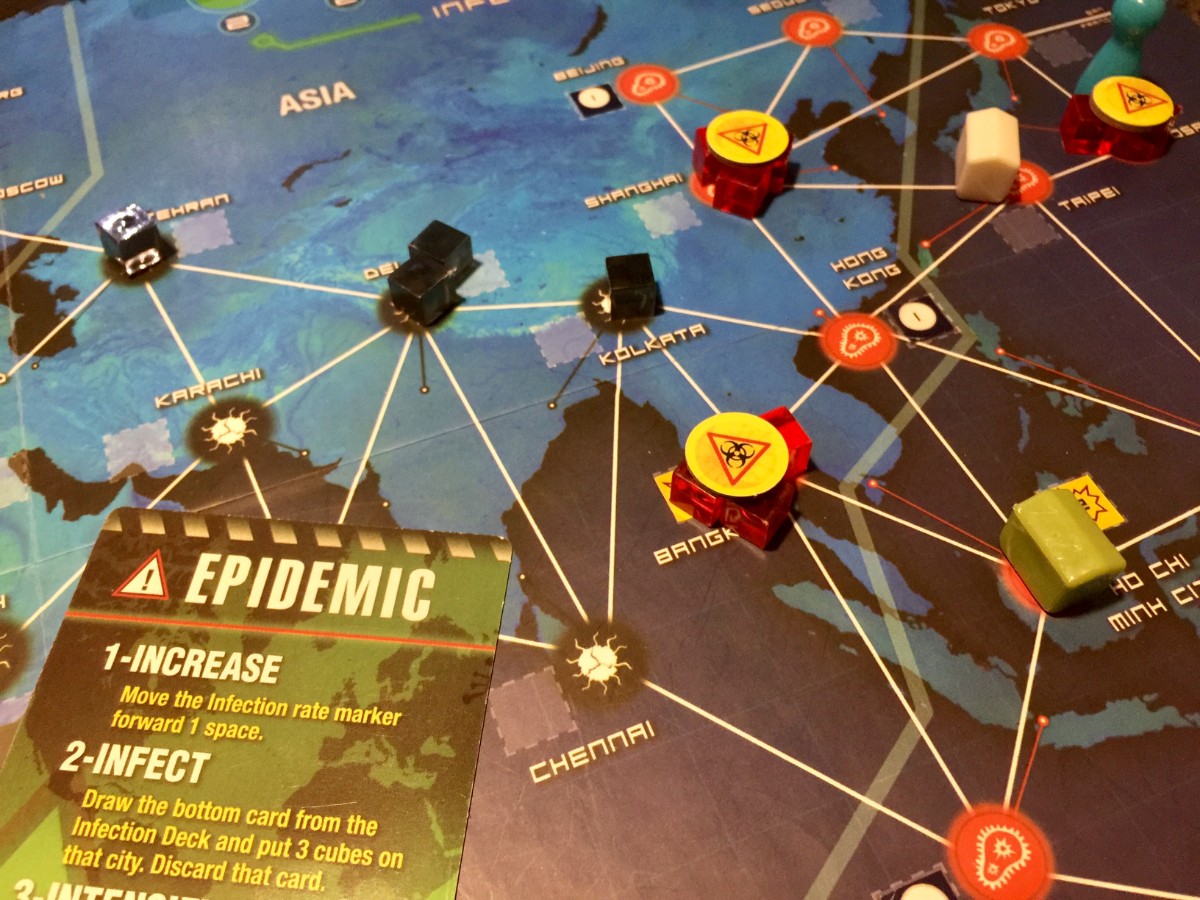
Children’s Games
Bugs & Co. (4+) – Players scramble in real time to find matching sets of three bugs (which score them points) and not get stuck with unfinished pairs (which lose them points). There’s a decent game here, though it might take a bit of experimentation with your group to find a play style that works. Age limit is flexible depending on how strict you are about not allowing players to look at the bugs they’ve already taken.
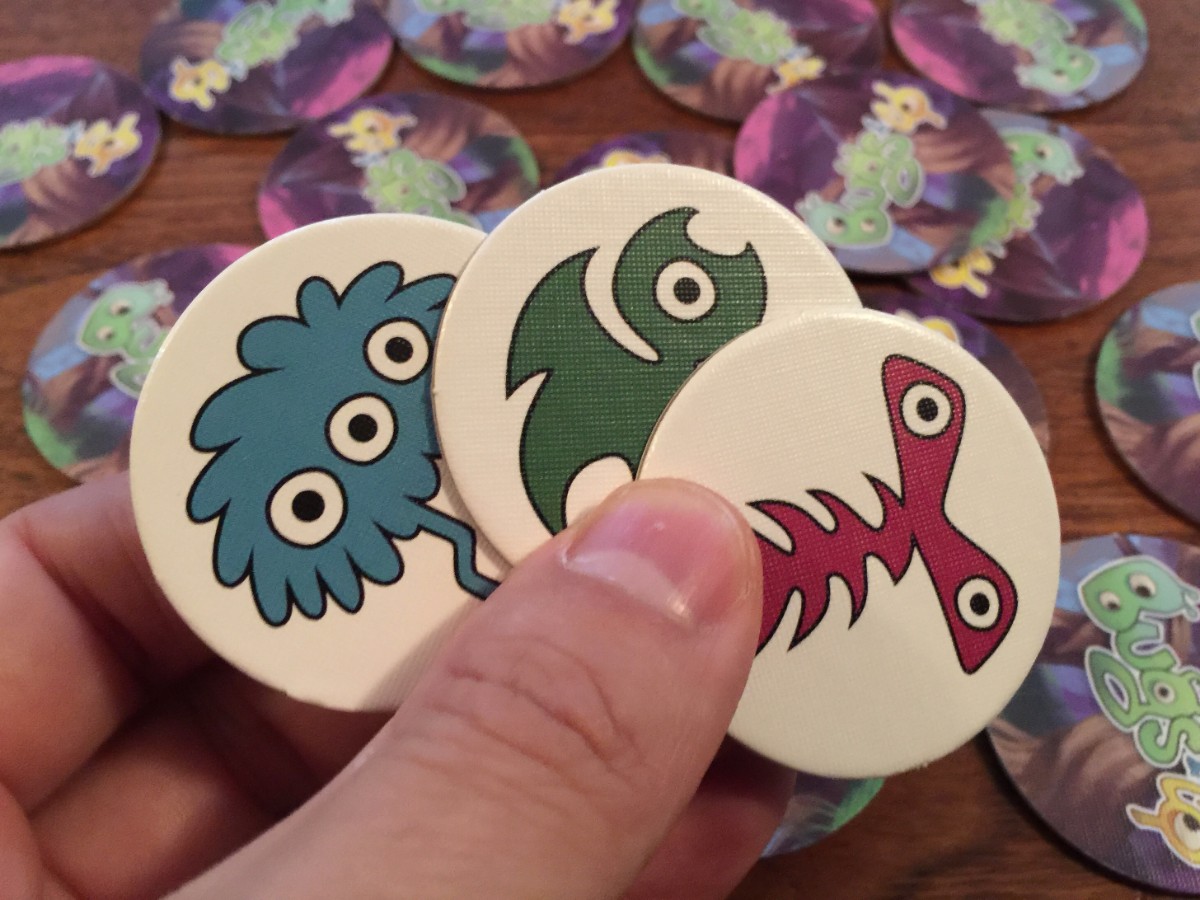
Sticky Stickz (4+) – Kids will love this game of smashing a suction cup stick down on a face that matches the expression, number, and color rolled on a set of dice. It’s definitely hard to play the full game with younger kids, but removing one or both of the dice will open up the ages that can play quite a bit!
[PICTURED ABOVE]
Hurry Cup! (6+) – You could take out a few of the chrome rules to lower the age range on this, but the central mechanic in this Formula D style game of picking a dice that is just high enough to beat the odds of going around a turn isn’t easy for kids to figure out. Luckily the game is forgiving enough that you can basically say “lots of big corners coming up, grab a low dice!” and it will work just fine.
[PICTURED ABOVE]
Pop Up Pirate (3+) – Not really a game, just another one of those “do random things until the jack in the box explodes” style games. Kids might have fun at least, if only stabbing pirates were appropriate for small kids.
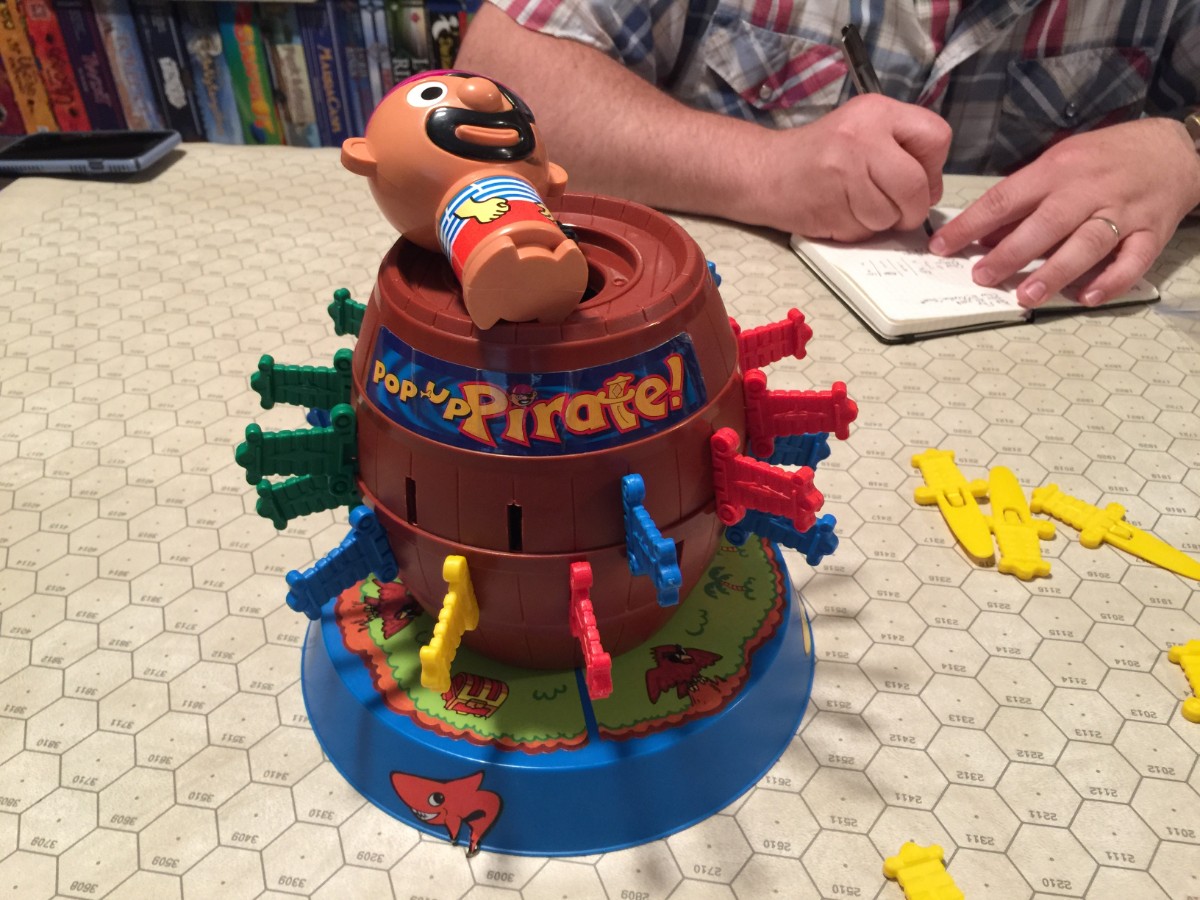
Cardline: Animals (5+) – The birds and smaller animals will definitely be tricky, but you can take out any animals you want/stack the deck only with obvious animals and allow a wide range of kids to have a pretty good time with this game of putting animals in line based on size and weight.
[PICTURED ABOVE]
Doctor Panic (6+) – I believe this real time game of doing a string of tasks to save a patient was probably aimed at adults, but the tasks are all so easy, it can easily be played with kids. Honestly, I was bored very quickly, but the 6 and 11 year old I played with loved it.
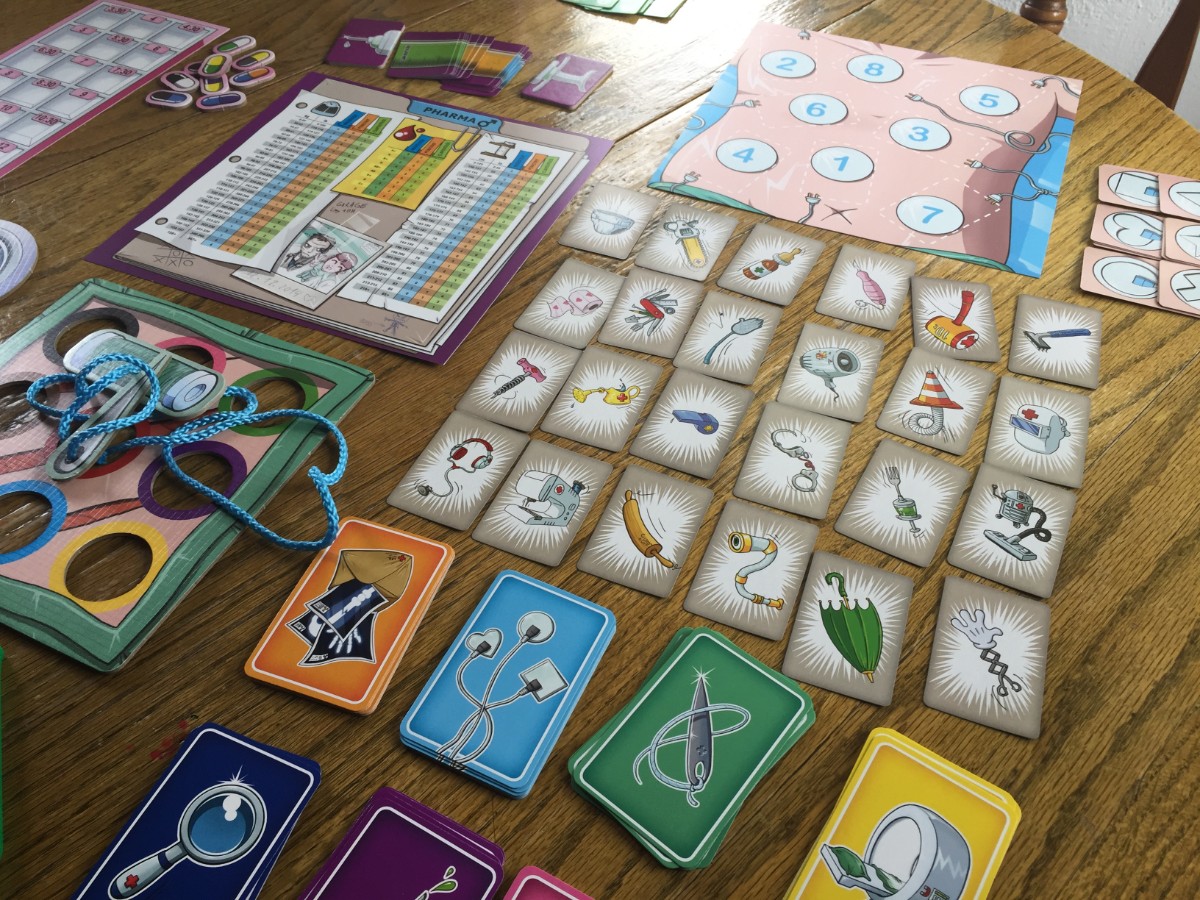
Loony Quest (5+) – This game of drawing lines on a transparency and then lining it up with the picture you were looking at to see how accurate it was is hard enough for adults, so, kids will most likely be terrible at it. Still, for good sports, it’s definitely worth a try! Definitely get the Loony Quest version too as it has a way cooler theme than other versions.
[PICTURED ABOVE]
Push a Monster (4+) – Using the two included cardboard pushers to slowly push monsters onto a platform without making any fall can be tricky for little hands, but you could always allow small children to just use their fingers. Otherwise, this one is quite a lot of fun, and can be easy enough to handicap yourself by going for hard sides of the board when pushing new monsters on.
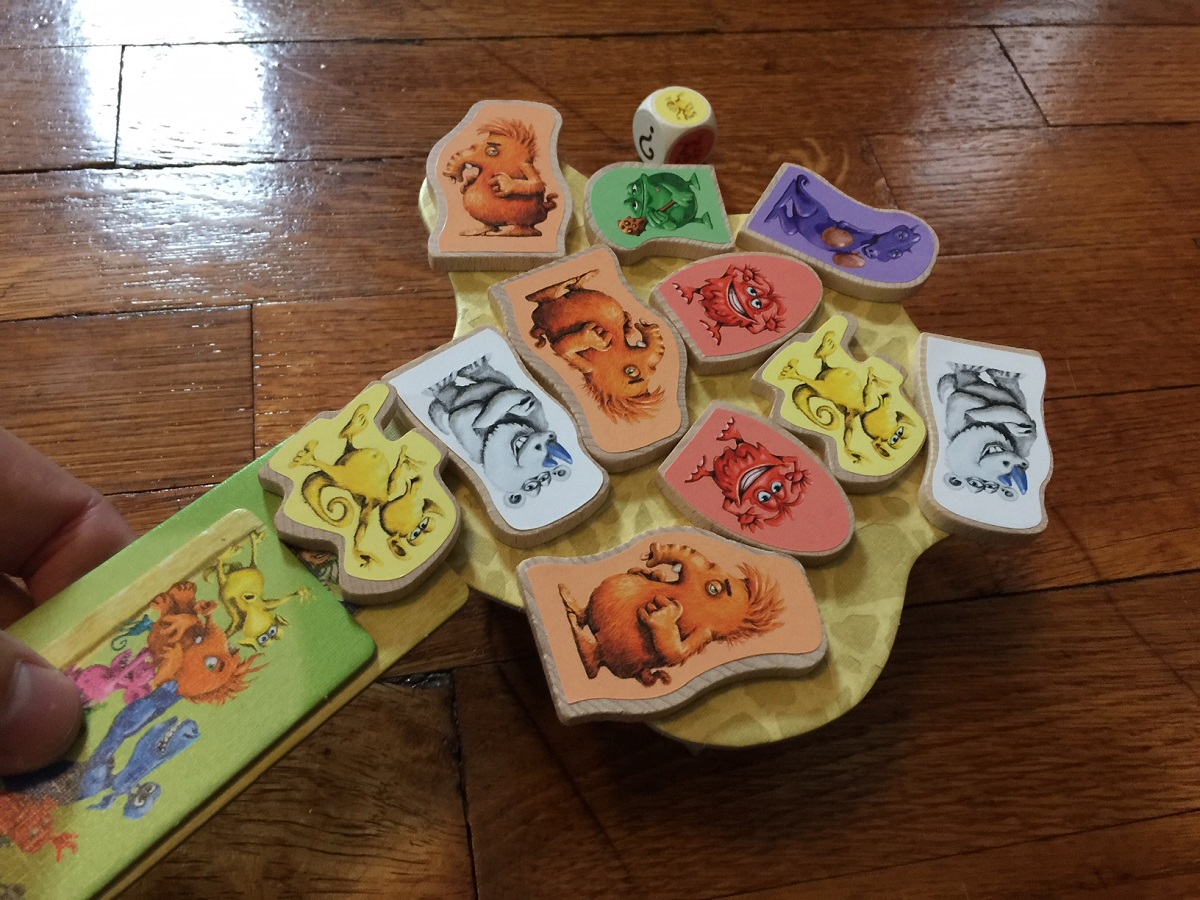
Help Me! (5+) – This is really more of an adult abstract game, and the scoring mechanism of only scoring stacks with your color, and getting bonus points for having more tiles of your color in the stack can be a little hard to grasp for young kids. The game is fine, but it’s not something I really see getting played much, by adults or kids.
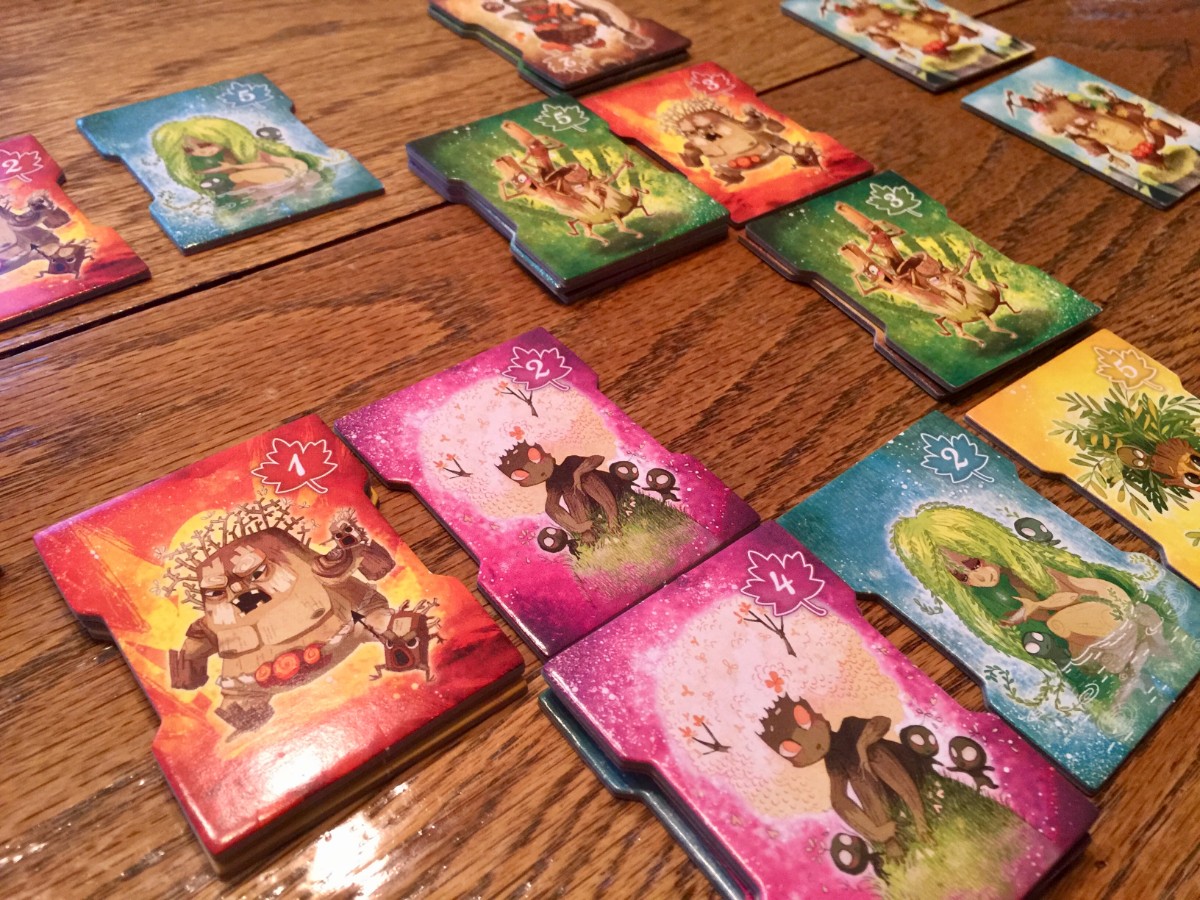
Silly Shenanigans (4+) – Roll a dice, draw an item out of the bag and either keep it or put it in the cave. Some dice rolls let you name items in the cave, if you are correct (and can use it), you get to keep it too! Pretty cool little game, and one that kids will love (if they can handle the “steal an item from another player” dice roll.
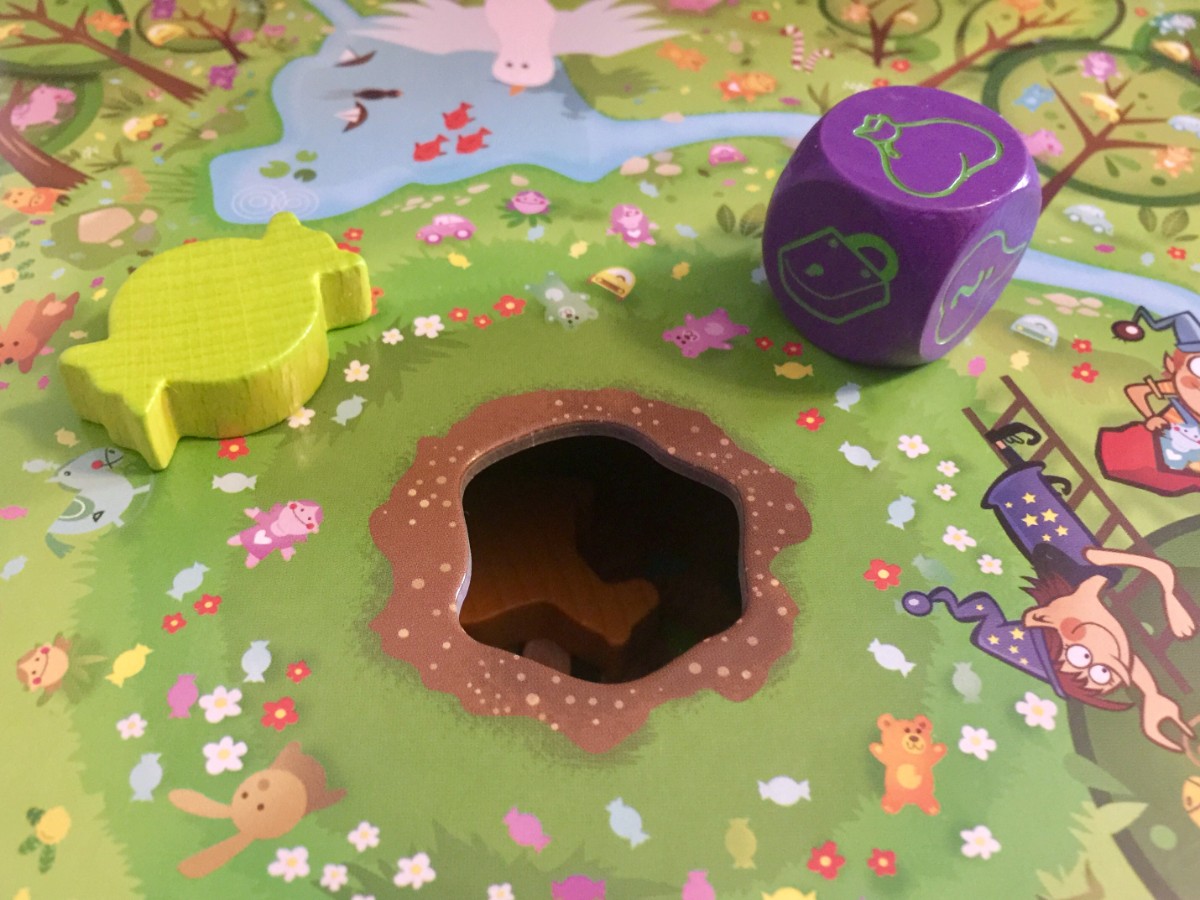
Banana Party (4+) – Fun game of picking branches to rotate clockwise…if your opponents have a monkey on that branch, the monkey will fall off and you will get their bananas. Pretty simple, but there are some good bluff elements at play, and the whole thing looks and feels very cool.
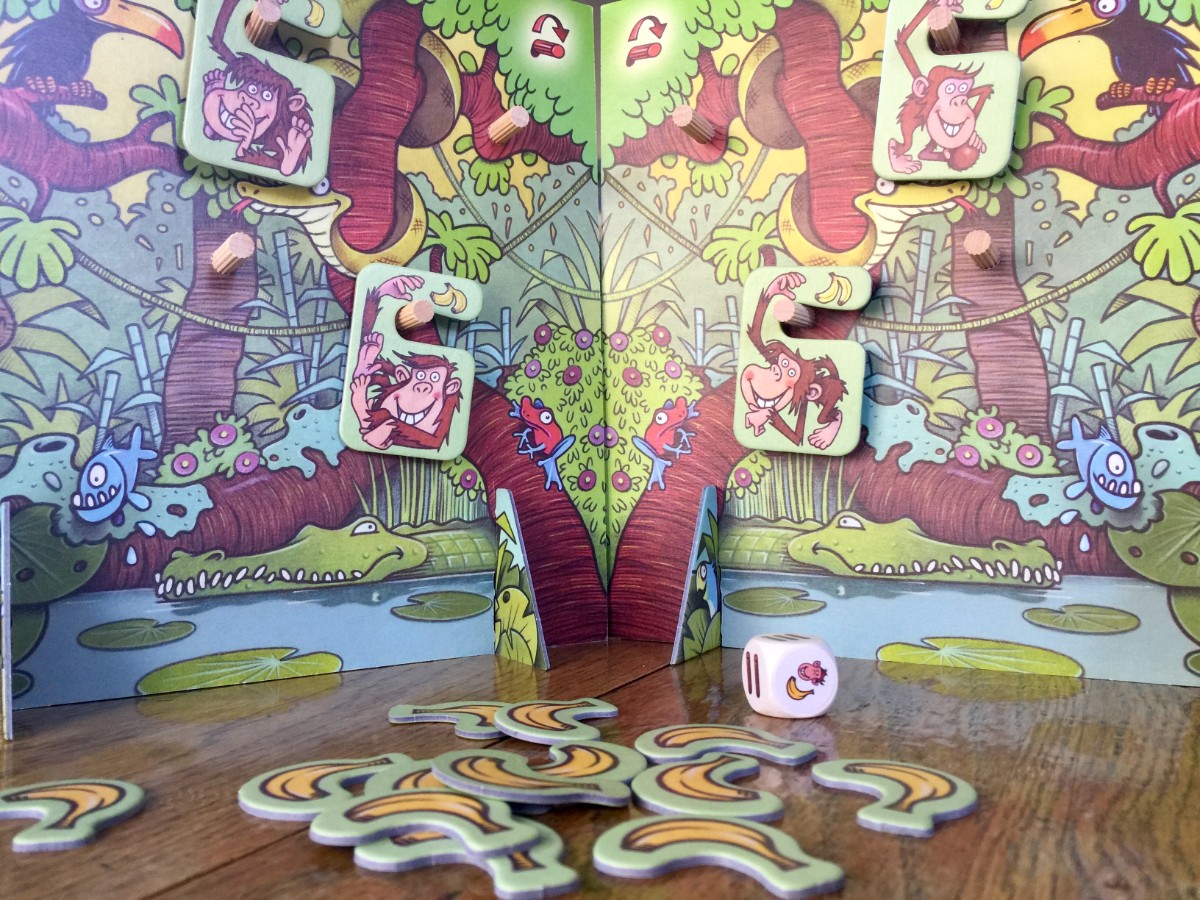
Mix & Match Robbers (4+) – Ok game of rolling a dice, flipping up a card and then quickly finding the correct head, torso and leg combination from the array on the table. It’s kind of cool, but half the time the dice rolls and card distribution just keep on coming up with stuff that’s already been taken, which definitely kills the momentum.

Sleepy Castle (4+) – Yet another Memory variation, this time you are trying to flip two center tiles that match adjacent outside tiles (to put them to sleep and steal their coins). As memory variations go, this is a good one, and the theme is great (and the number of options seems to be just about right to keep the difficulty manageable), so I’d definitely recommend this as a good one if you can find it cheaply.
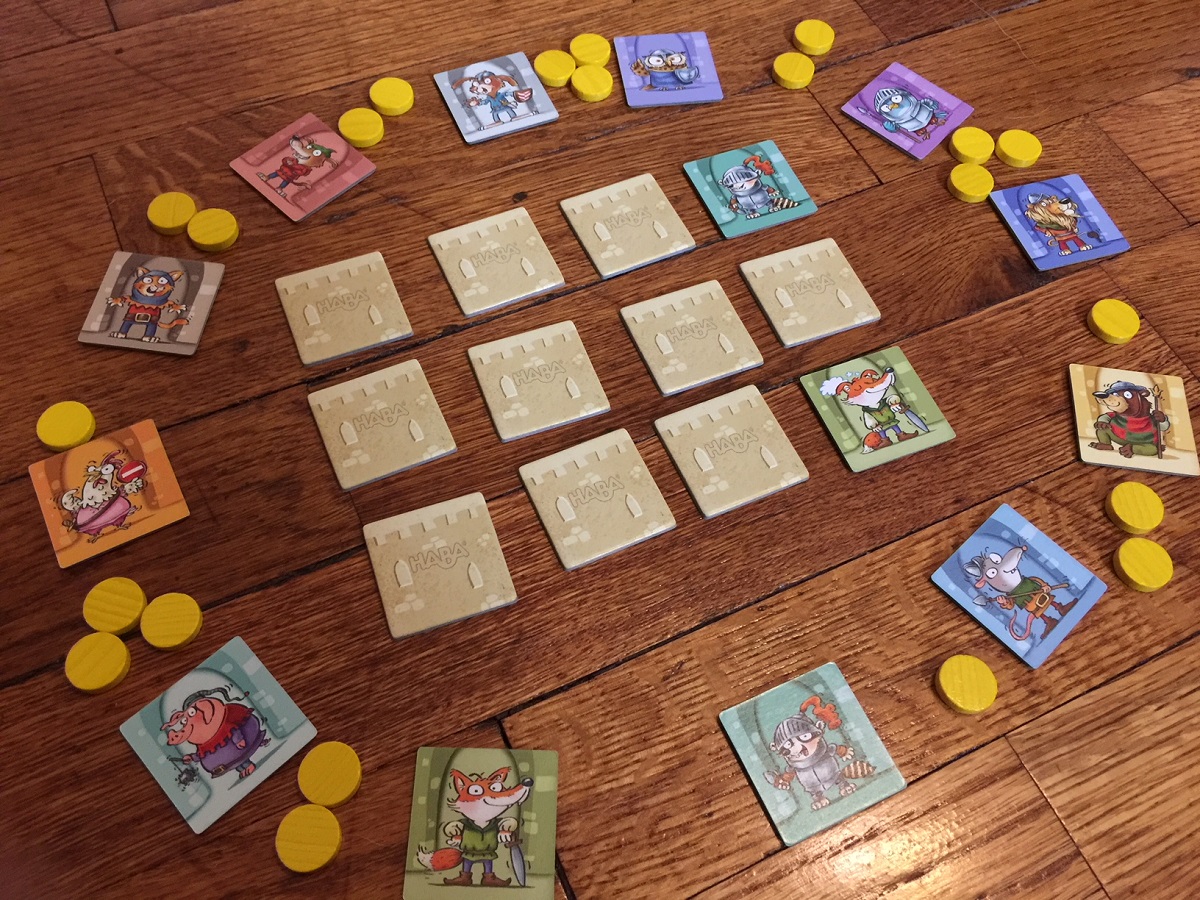
Expansions
Neuroshima Hex! Iron Gang – The Iron Gang isn’t a radical departure from the base sets, the two main differences being their ranged nets (kind of fiddly) and their “clothesline” chains (kind of cool). They seem slightly underpowered, but they are pretty fun to play and a good addition to the Hex factions.
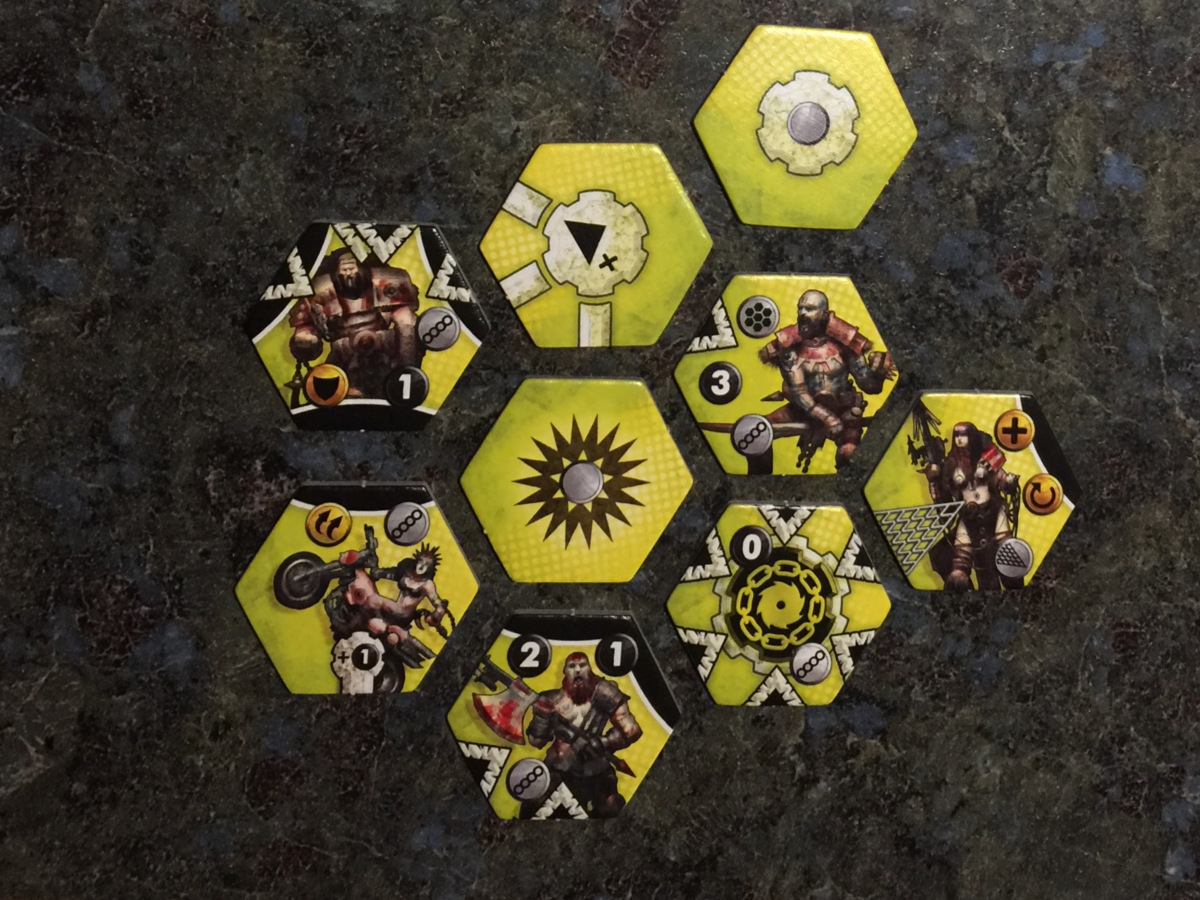
Railways of Mexico – The Mexico map is designed for 2-3 players and is quite welcome when you have a low player count. There are a ton of mountains, so be prepared to take out a lot of loans, but otherwise, this is the map you want for 2-3.
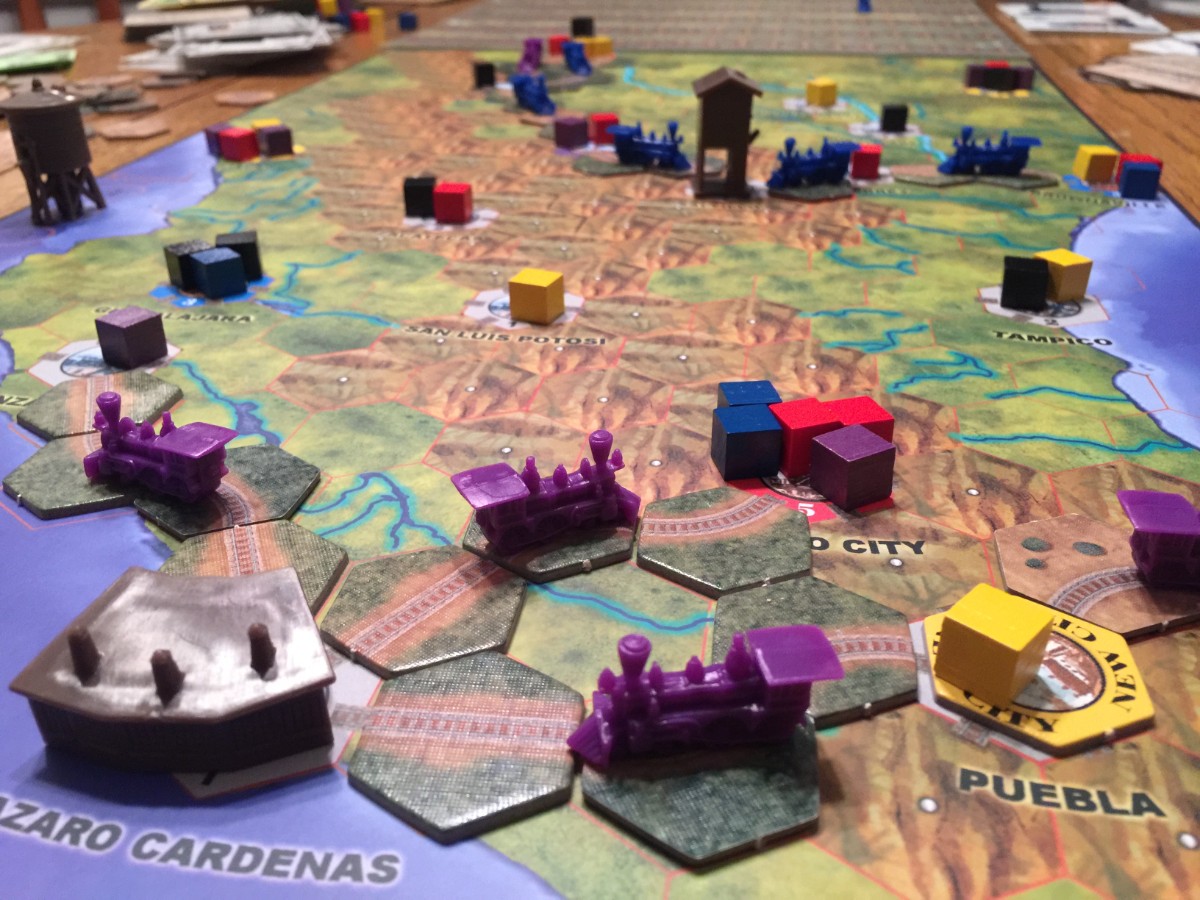
T.I.M.E. Stories: Under the Mask – A good outing for the series…nothing too groundbreaking, but the puzzles were all fair enough, and there were no major rules ambiguities, so I’ll call it a win. The switching bodies mechanic was fun, and implemented well, and there were a few really creative uses of the system to cap things off. My appreciation for this expansion was probably increased due to not falling for any of the red herring dead ends which would have pissed me off if a run got ended because of them.
Krosmaster Arena: Boufbowl – Playing the teams against each other with Krosmaster rules revealed that the boufball token was surprisingly hard to set up cool plays with. I’m sure a bit more practice would improve my positioning, but as it was the boufball movers seemed underpowered compared to Laika (when buffed), Marty (one hell of a teleporter), and Amalius (deceptively strong).
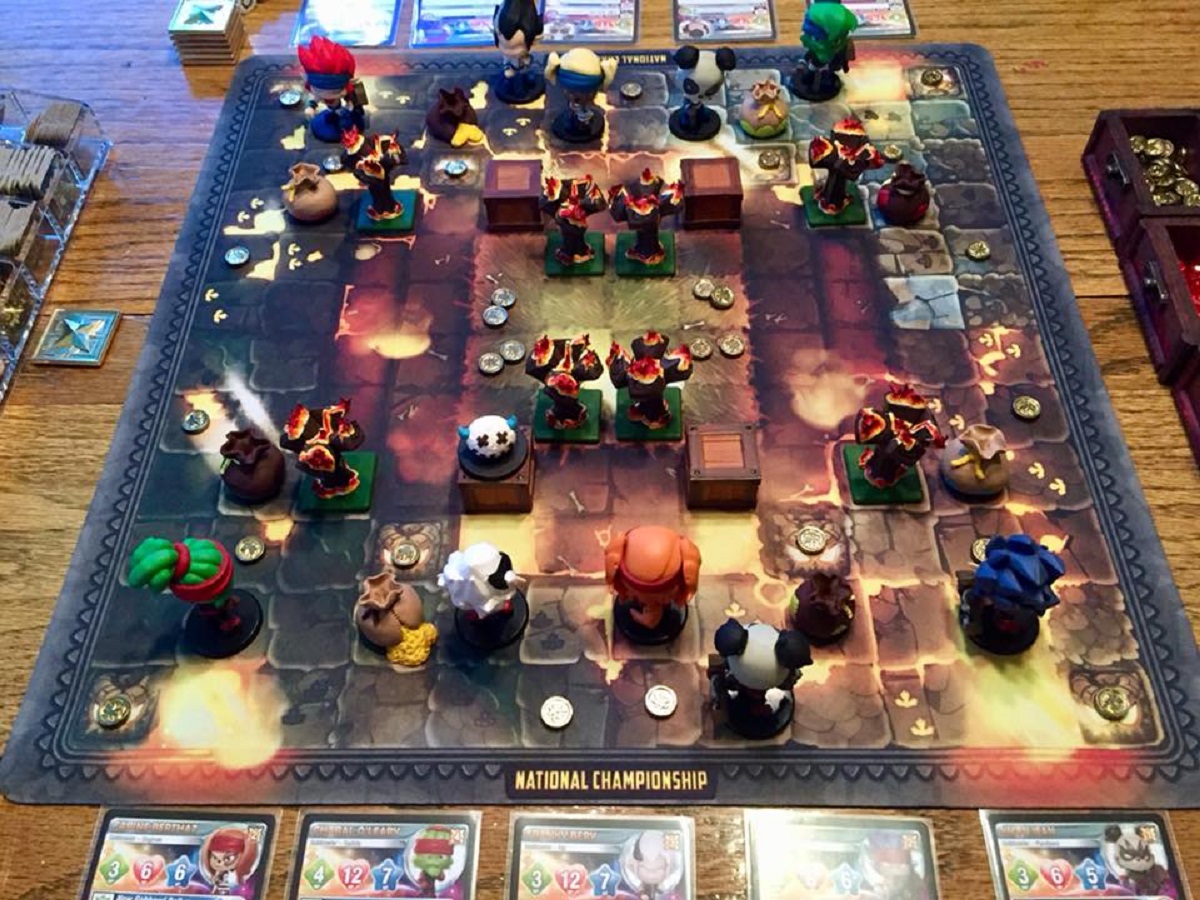

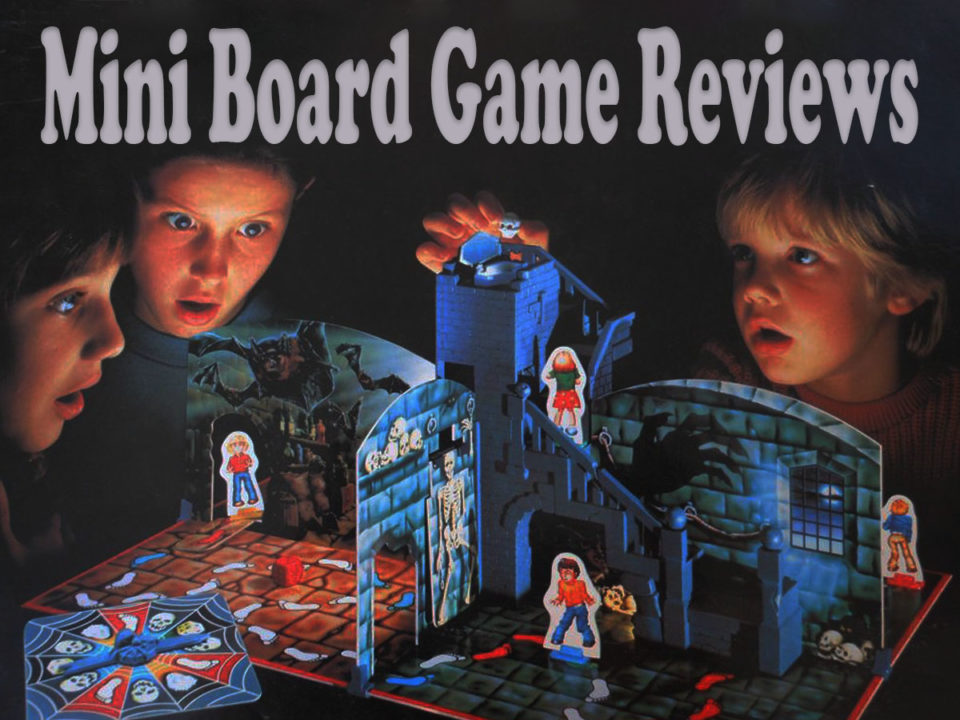
Leave A Reply